

Editing and Proofreading
What this handout is about.
This handout provides some tips and strategies for revising your writing. To give you a chance to practice proofreading, we have left seven errors (three spelling errors, two punctuation errors, and two grammatical errors) in the text of this handout. See if you can spot them!
Is editing the same thing as proofreading?
Not exactly. Although many people use the terms interchangeably, editing and proofreading are two different stages of the revision process. Both demand close and careful reading, but they focus on different aspects of the writing and employ different techniques.
Some tips that apply to both editing and proofreading
- Get some distance from the text! It’s hard to edit or proofread a paper that you’ve just finished writing—it’s still to familiar, and you tend to skip over a lot of errors. Put the paper aside for a few hours, days, or weeks. Go for a run. Take a trip to the beach. Clear your head of what you’ve written so you can take a fresh look at the paper and see what is really on the page. Better yet, give the paper to a friend—you can’t get much more distance than that. Someone who is reading the paper for the first time, comes to it with completely fresh eyes.
- Decide which medium lets you proofread most carefully. Some people like to work right at the computer, while others like to sit back with a printed copy that they can mark up as they read.
- Try changing the look of your document. Altering the size, spacing, color, or style of the text may trick your brain into thinking it’s seeing an unfamiliar document, and that can help you get a different perspective on what you’ve written.
- Find a quiet place to work. Don’t try to do your proofreading in front of the TV or while you’re chugging away on the treadmill. Find a place where you can concentrate and avoid distractions.
- If possible, do your editing and proofreading in several short blocks of time. Your concentration may start to wane if you try to proofread the entire text at one time.
- If you’re short on time, you may wish to prioritize. Make sure that you complete the most important editing and proofreading tasks.
Editing is what you begin doing as soon as you finish your first draft. You reread your draft to see, for example, whether the paper is well-organized, the transitions between paragraphs are smooth, and your evidence really backs up your argument. You can edit on several levels:
Have you done everything the assignment requires? Are the claims you make accurate? If it is required to do so, does your paper make an argument? Is the argument complete? Are all of your claims consistent? Have you supported each point with adequate evidence? Is all of the information in your paper relevant to the assignment and/or your overall writing goal? (For additional tips, see our handouts on understanding assignments and developing an argument .)
Overall structure
Does your paper have an appropriate introduction and conclusion? Is your thesis clearly stated in your introduction? Is it clear how each paragraph in the body of your paper is related to your thesis? Are the paragraphs arranged in a logical sequence? Have you made clear transitions between paragraphs? One way to check the structure of your paper is to make a reverse outline of the paper after you have written the first draft. (See our handouts on introductions , conclusions , thesis statements , and transitions .)
Structure within paragraphs
Does each paragraph have a clear topic sentence? Does each paragraph stick to one main idea? Are there any extraneous or missing sentences in any of your paragraphs? (See our handout on paragraph development .)
Have you defined any important terms that might be unclear to your reader? Is the meaning of each sentence clear? (One way to answer this question is to read your paper one sentence at a time, starting at the end and working backwards so that you will not unconsciously fill in content from previous sentences.) Is it clear what each pronoun (he, she, it, they, which, who, this, etc.) refers to? Have you chosen the proper words to express your ideas? Avoid using words you find in the thesaurus that aren’t part of your normal vocabulary; you may misuse them.
Have you used an appropriate tone (formal, informal, persuasive, etc.)? Is your use of gendered language (masculine and feminine pronouns like “he” or “she,” words like “fireman” that contain “man,” and words that some people incorrectly assume apply to only one gender—for example, some people assume “nurse” must refer to a woman) appropriate? Have you varied the length and structure of your sentences? Do you tends to use the passive voice too often? Does your writing contain a lot of unnecessary phrases like “there is,” “there are,” “due to the fact that,” etc.? Do you repeat a strong word (for example, a vivid main verb) unnecessarily? (For tips, see our handouts on style and gender-inclusive language .)
Have you appropriately cited quotes, paraphrases, and ideas you got from sources? Are your citations in the correct format? (See the UNC Libraries citation tutorial for more information.)
As you edit at all of these levels, you will usually make significant revisions to the content and wording of your paper. Keep an eye out for patterns of error; knowing what kinds of problems you tend to have will be helpful, especially if you are editing a large document like a thesis or dissertation. Once you have identified a pattern, you can develop techniques for spotting and correcting future instances of that pattern. For example, if you notice that you often discuss several distinct topics in each paragraph, you can go through your paper and underline the key words in each paragraph, then break the paragraphs up so that each one focuses on just one main idea.
Proofreading
Proofreading is the final stage of the editing process, focusing on surface errors such as misspellings and mistakes in grammar and punctuation. You should proofread only after you have finished all of your other editing revisions.
Why proofread? It’s the content that really matters, right?
Content is important. But like it or not, the way a paper looks affects the way others judge it. When you’ve worked hard to develop and present your ideas, you don’t want careless errors distracting your reader from what you have to say. It’s worth paying attention to the details that help you to make a good impression.
Most people devote only a few minutes to proofreading, hoping to catch any glaring errors that jump out from the page. But a quick and cursory reading, especially after you’ve been working long and hard on a paper, usually misses a lot. It’s better to work with a definite plan that helps you to search systematically for specific kinds of errors.
Sure, this takes a little extra time, but it pays off in the end. If you know that you have an effective way to catch errors when the paper is almost finished, you can worry less about editing while you are writing your first drafts. This makes the entire writing proccess more efficient.
Try to keep the editing and proofreading processes separate. When you are editing an early draft, you don’t want to be bothered with thinking about punctuation, grammar, and spelling. If your worrying about the spelling of a word or the placement of a comma, you’re not focusing on the more important task of developing and connecting ideas.
The proofreading process
You probably already use some of the strategies discussed below. Experiment with different tactics until you find a system that works well for you. The important thing is to make the process systematic and focused so that you catch as many errors as possible in the least amount of time.
- Don’t rely entirely on spelling checkers. These can be useful tools but they are far from foolproof. Spell checkers have a limited dictionary, so some words that show up as misspelled may really just not be in their memory. In addition, spell checkers will not catch misspellings that form another valid word. For example, if you type “your” instead of “you’re,” “to” instead of “too,” or “there” instead of “their,” the spell checker won’t catch the error.
- Grammar checkers can be even more problematic. These programs work with a limited number of rules, so they can’t identify every error and often make mistakes. They also fail to give thorough explanations to help you understand why a sentence should be revised. You may want to use a grammar checker to help you identify potential run-on sentences or too-frequent use of the passive voice, but you need to be able to evaluate the feedback it provides.
- Proofread for only one kind of error at a time. If you try to identify and revise too many things at once, you risk losing focus, and your proofreading will be less effective. It’s easier to catch grammar errors if you aren’t checking punctuation and spelling at the same time. In addition, some of the techniques that work well for spotting one kind of mistake won’t catch others.
- Read slow, and read every word. Try reading out loud , which forces you to say each word and also lets you hear how the words sound together. When you read silently or too quickly, you may skip over errors or make unconscious corrections.
- Separate the text into individual sentences. This is another technique to help you to read every sentence carefully. Simply press the return key after every period so that every line begins a new sentence. Then read each sentence separately, looking for grammar, punctuation, or spelling errors. If you’re working with a printed copy, try using an opaque object like a ruler or a piece of paper to isolate the line you’re working on.
- Circle every punctuation mark. This forces you to look at each one. As you circle, ask yourself if the punctuation is correct.
- Read the paper backwards. This technique is helpful for checking spelling. Start with the last word on the last page and work your way back to the beginning, reading each word separately. Because content, punctuation, and grammar won’t make any sense, your focus will be entirely on the spelling of each word. You can also read backwards sentence by sentence to check grammar; this will help you avoid becoming distracted by content issues.
- Proofreading is a learning process. You’re not just looking for errors that you recognize; you’re also learning to recognize and correct new errors. This is where handbooks and dictionaries come in. Keep the ones you find helpful close at hand as you proofread.
- Ignorance may be bliss, but it won’t make you a better proofreader. You’ll often find things that don’t seem quite right to you, but you may not be quite sure what’s wrong either. A word looks like it might be misspelled, but the spell checker didn’t catch it. You think you need a comma between two words, but you’re not sure why. Should you use “that” instead of “which”? If you’re not sure about something, look it up.
- The proofreading process becomes more efficient as you develop and practice a systematic strategy. You’ll learn to identify the specific areas of your own writing that need careful attention, and knowing that you have a sound method for finding errors will help you to focus more on developing your ideas while you are drafting the paper.
Think you’ve got it?
Then give it a try, if you haven’t already! This handout contains seven errors our proofreader should have caught: three spelling errors, two punctuation errors, and two grammatical errors. Try to find them, and then check a version of this page with the errors marked in red to see if you’re a proofreading star.
Works consulted
We consulted these works while writing this handout. This is not a comprehensive list of resources on the handout’s topic, and we encourage you to do your own research to find additional publications. Please do not use this list as a model for the format of your own reference list, as it may not match the citation style you are using. For guidance on formatting citations, please see the UNC Libraries citation tutorial . We revise these tips periodically and welcome feedback.
Especially for non-native speakers of English:
Ascher, Allen. 2006. Think About Editing: An ESL Guide for the Harbrace Handbooks . Boston: Wadsworth Cengage Learning.
Lane, Janet, and Ellen Lange. 2012. Writing Clearly: Grammar for Editing , 3rd ed. Boston: Heinle.
For everyone:
Einsohn, Amy. 2011. The Copyeditor’s Handbook: A Guide for Book Publishing and Corporate Communications , 3rd ed. Berkeley: University of California Press.
Lanham, Richard A. 2006. Revising Prose , 5th ed. New York: Pearson Longman.
Tarshis, Barry. 1998. How to Be Your Own Best Editor: The Toolkit for Everyone Who Writes . New York: Three Rivers Press.
You may reproduce it for non-commercial use if you use the entire handout and attribute the source: The Writing Center, University of North Carolina at Chapel Hill
Make a Gift
Last places remaining for June 30th, July 14th and July 28th courses . Enrol now and join students from 175 countries for the summer of a lifetime
- 13 Essential Editing Tips to Use in Your Essay Writing

The good student strives constantly to achieve a better essay each time they write one.
It can be a challenge to find ways to keep improving, but one way of making your essays instantly better is effective editing. Editing your essay before you submit it could mean the difference between a good grade and a brilliant one, so it’s worth taking fifteen minutes or so before you send it off just checking through it to make sure that the structure and wording is as good as it can be. In this article, we give you some tips to think about when you’re editing your own writing. Keep these tips alongside you to use as a checklist and you can’t go far wrong!
1. Start by getting the structure right
If you have time, try to leave a bit of time between finishing your essay and starting the editing process. This gives you time to approach it feeling reasonably fresh; if you edit immediately after spending a long time on something, you might find that you’re so close to it that you’re unable to spot errors. When you do sit down to look through it, start by looking at its structure. Think about the overarching shape of the argument you’re developing and check that the points you’ve made help build your essay towards a logical conclusion. You may have written an essay with the points in order of when they occurred to you, but is this really the most sensible order? Does one point follow logically on from the other? Would it make the essay more interesting to include a certain point near the beginning to tease the reader, or are you revealing too much in the opening, meaning it would be better to move some points nearer the end? These are just a few of the ways in which it might be possible to improve the structure, so it helps to keep in mind your overall argument and ensure your structure puts it across as effectively as possible. With word processors now the primary means of writing essays, it couldn’t be easier to rearrange paragraphs into a more logical structure by dragging and dropping or cutting and pasting paragraphs. If you do this, don’t forget to reread the essay to ensure that the wording works with this new order, otherwise you may end up with a sentence leading into the wrong paragraph.
2. Prune long sentences and paragraphs
Whether you’ve exceeded your word count or not, long sentences and paragraphs should be edited because they can be trickier to read, and risk being boring or hard to follow. Try, therefore, to keep sentences to a maximum of two or three clauses (or segments). Avoid long paragraphs by starting a new one if you find one getting longer than three or four sentences: a wall of text can be off-putting to the reader. Leave a space between paragraphs if you’re typing your essay, as we’re doing in this article. Another way of keeping sentences to a reasonable length is to go through what you’ve written and tighten up the wording. If you find yourself writing long sentences, try to look for ways in which you can reword them to express what you’re trying to say more concisely. You’ll probably find numerous instances of phrases that take many words to say what could be said in two or three.
3. Keep overly complicated language in check
It’s going to look obvious if you’ve had a thesaurus next to you while writing, just so that you can replace all the simple words with more complicated ones. The thing is, it doesn’t always make you look intelligent; you may, for instance, inadvertently choose the wrong synonym, not realising that even close synonyms can have subtly different meanings or connotations. Sometimes using big words where simple ones would suffice can seem contrived and pompous; aim for clear, concise language to avoid being verbose or pretentious. That’s not to say you shouldn’t use more complex words at all – just choose the situation carefully and don’t overdo it.
4. Watch for repetition of ideas and words
It’s easy to repeat yourself without realising it when you’re writing, but the editing process is there to enable you to spot this before your teacher or lecturer sees it. As you read through your essay, keep a look out for ideas you’ve repeated and delete whichever repetitions add nothing to your essay (don’t forget that the first instance of the idea may not be the most appropriate place for it, so consider which is the best moment to introduce it and delete the other mentions). On a related note, look out for instances in which you’ve laboured the point. Going on about a particular point for too long can actually undermine the strength of your argument, because it makes you look as though you’re desperately grappling to find supporting facts; sometimes a simple, clear statement with a brief piece of evidence to back it up is all that’s needed. You should be equally wary of repetition of words within the same sentence or paragraph. It’s fine to repeat common words such as “the”, obviously, but it’s best to avoid using the same connecting words, such as “also”, more than once in the same paragraph. Rephrase using alternative expressions, such as “what’s more”. More unusual words should be used just once per paragraph – words such as “unavoidable”, for example – unless it’s for emphasis.
5. Don’t rely on the spellcheck
It’s a tip we’ve told you before, but it’s worth repeating because it’s very important! The spellcheck will not pick up every single error in your essay. It may highlight some typos and misspellings, but it won’t tell you if you’ve inadvertently used the wrong word altogether. For example, you may have meant to write the word “from”, but accidentally mistyped it as “form” – which is still a word, so the spellchecker won’t register it. But it’s not the word you meant to write.
6. Spotting typos
It’s said that if you read through your work backwards, you’re more likely to spot typos. This is probably because it’s giving you a new perspective on what you’ve written, making it easier to spot glaring errors than if you read through it in the order in which you wrote it and in which you know what to expect. So, start with the last sentence and keep going in reverse order until you get to the beginning of your essay. Another tip is to print out your essay and take a red pen to it, circling or underlining all the errors and then correcting them on the computer later. It’s often easier to read a document from a printed version, and it also means that you can follow what you’re doing by touching each word with the end of your pencil to make sure you’re not skimming over any errors.
7. Omit unnecessary words and eradicate weasel words
Without even realising it, you’ve probably used plenty of unnecessary words in your writing – words that add to the word count without adding to the meaning – and you’ll find that your writing works just as well without them. An example is the word “very”, which almost always adds nothing to what you’re trying to say. As Mark Twain said, “Substitute ‘damn’ every time you’re inclined to write ‘very’; your editor will delete it and the writing will be just as it should be”. Weasel words are worse, as they are used to hide weak or objectionable arguments. A study of Wikipedia found that these tend to fall into three different categories: numerical vagueness (such as “many people say” without specifying who these people are), the use of the passive voice to distance the writer from what they’re saying (“it is often said”, for example, without saying by whom it is often said), and the use of adverbs designed to soften a point (such as “probably”). Look out for these in your own writing and rephrase to remove them; they are disingenuous and your essay will be stronger without them.
8. Remove tautologies
A tautology is a stylistic error involving redundant words, in this case the use of two consecutive words that mean the same thing, such as “the big giant” (referring simply to a “giant” would have been sufficient to convey the meaning). Students often use them when they’re trying to make their writing wordier, not realising that they simply make their writing worse.
9. Watch the commas
People tend either to put too many commas into a sentence, or too few. Too many, and the sentence sounds broken and odd; too few, and the reader has to read the sentence several times to figure out what you’re trying to say, because it comes out in a long, jumbled mess. The secret is to put commas in where you would naturally pause when speaking aloud. If it helps, try reading your writing aloud to see if it flows. Where you would pause for slightly longer, a semi-colon might be more appropriate than a comma. Use a semi-colon to connect two independent clauses that would work as two separate sentences.
10. Consistent spelling
Some words have more than one correct spelling, and the important thing is to be consistent with which one you use. You could, if you wanted to make your life a little easier, delve into the settings on your word processor and manipulate the spellcheck so that it highlights the version you decided against – or even autocorrects to the right version. If you’re writing in the UK, ensure that your word processor’s default language is set to UK English so that you don’t end up inadvertently correcting English spellings to US ones (“colour” to “color”, for example).
11. Get rid of exclamation marks and ellipses
In virtually every case, you don’t need to use an exclamation mark, and – at least in academic writing – your use of one may result in your writing not being taken quite so seriously. Only use them in exceptional circumstances when you really want to convey a feeling of surprise or outrage. Ellipses (“…”) should also be avoided except when you’re indicating the truncation of a quote from another writer (that is, where you left a bit out).
12. Attribute quotations
Quotations from authors or academic writers should be attributed to them. As you read through your essay, keep a look out for any quotations you’ve mentioned and make sure that you say where they’re from. If you’re writing an essay for university, a footnote would be an appropriate way of citing another writer. If you are using footnotes, this gives an extra area on which to focus your editing skills; ensure that all footnotes are consistently formatted, and don’t forget to put a bibliography containing all the books you’ve used at the end.
13. Consistent formatting
The appearance of your essay matters, too – and the formatting should not be neglected when you’re in editing mode. This means being consistent with your use of fonts, using italics or underline for emphasis rather than using them interchangeably, ensuring that the spacing between lines is consistent throughout, and other such minor aesthetic points. This may not sound very important, but consistent formatting helps your essay look professional; if you’ve used different fonts or line spacing or anything like that, your essay will look a mess even if what you’ve said in it is good. You could make use of the pre-populated formatting options in your word processor to ensure consistency throughout, with header 1 for the title, header 2 for subheadings and ‘normal text’ for the body of the document. If you find that there are too many things on this list to think about in one go when you’re reading through your essay, you could read through it several times looking out for different things each time. All this may seem a lot to think about when you’ve already put in so much effort to write the essay in the first place, but trust us: it will pay off with a sleek and polished piece.

Choose Your Test
Sat / act prep online guides and tips, getting college essay help: important do's and don’ts.
College Essays

If you grow up to be a professional writer, everything you write will first go through an editor before being published. This is because the process of writing is really a process of re-writing —of rethinking and reexamining your work, usually with the help of someone else. So what does this mean for your student writing? And in particular, what does it mean for very important, but nonprofessional writing like your college essay? Should you ask your parents to look at your essay? Pay for an essay service?
If you are wondering what kind of help you can, and should, get with your personal statement, you've come to the right place! In this article, I'll talk about what kind of writing help is useful, ethical, and even expected for your college admission essay . I'll also point out who would make a good editor, what the differences between editing and proofreading are, what to expect from a good editor, and how to spot and stay away from a bad one.
Table of Contents
What Kind of Help for Your Essay Can You Get?
What's Good Editing?
What should an editor do for you, what kind of editing should you avoid, proofreading, what's good proofreading, what kind of proofreading should you avoid.
What Do Colleges Think Of You Getting Help With Your Essay?
Who Can/Should Help You?
Advice for editors.
Should You Pay Money For Essay Editing?
The Bottom Line
What's next, what kind of help with your essay can you get.
Rather than talking in general terms about "help," let's first clarify the two different ways that someone else can improve your writing . There is editing, which is the more intensive kind of assistance that you can use throughout the whole process. And then there's proofreading, which is the last step of really polishing your final product.
Let me go into some more detail about editing and proofreading, and then explain how good editors and proofreaders can help you."
Editing is helping the author (in this case, you) go from a rough draft to a finished work . Editing is the process of asking questions about what you're saying, how you're saying it, and how you're organizing your ideas. But not all editing is good editing . In fact, it's very easy for an editor to cross the line from supportive to overbearing and over-involved.
Ability to clarify assignments. A good editor is usually a good writer, and certainly has to be a good reader. For example, in this case, a good editor should make sure you understand the actual essay prompt you're supposed to be answering.
Open-endedness. Good editing is all about asking questions about your ideas and work, but without providing answers. It's about letting you stick to your story and message, and doesn't alter your point of view.

Think of an editor as a great travel guide. It can show you the many different places your trip could take you. It should explain any parts of the trip that could derail your trip or confuse the traveler. But it never dictates your path, never forces you to go somewhere you don't want to go, and never ignores your interests so that the trip no longer seems like it's your own. So what should good editors do?
Help Brainstorm Topics
Sometimes it's easier to bounce thoughts off of someone else. This doesn't mean that your editor gets to come up with ideas, but they can certainly respond to the various topic options you've come up with. This way, you're less likely to write about the most boring of your ideas, or to write about something that isn't actually important to you.
If you're wondering how to come up with options for your editor to consider, check out our guide to brainstorming topics for your college essay .
Help Revise Your Drafts
Here, your editor can't upset the delicate balance of not intervening too much or too little. It's tricky, but a great way to think about it is to remember: editing is about asking questions, not giving answers .
Revision questions should point out:
- Places where more detail or more description would help the reader connect with your essay
- Places where structure and logic don't flow, losing the reader's attention
- Places where there aren't transitions between paragraphs, confusing the reader
- Moments where your narrative or the arguments you're making are unclear
But pointing to potential problems is not the same as actually rewriting—editors let authors fix the problems themselves.

Bad editing is usually very heavy-handed editing. Instead of helping you find your best voice and ideas, a bad editor changes your writing into their own vision.
You may be dealing with a bad editor if they:
- Add material (examples, descriptions) that doesn't come from you
- Use a thesaurus to make your college essay sound "more mature"
- Add meaning or insight to the essay that doesn't come from you
- Tell you what to say and how to say it
- Write sentences, phrases, and paragraphs for you
- Change your voice in the essay so it no longer sounds like it was written by a teenager
Colleges can tell the difference between a 17-year-old's writing and a 50-year-old's writing. Not only that, they have access to your SAT or ACT Writing section, so they can compare your essay to something else you wrote. Writing that's a little more polished is great and expected. But a totally different voice and style will raise questions.
Where's the Line Between Helpful Editing and Unethical Over-Editing?
Sometimes it's hard to tell whether your college essay editor is doing the right thing. Here are some guidelines for staying on the ethical side of the line.
- An editor should say that the opening paragraph is kind of boring, and explain what exactly is making it drag. But it's overstepping for an editor to tell you exactly how to change it.
- An editor should point out where your prose is unclear or vague. But it's completely inappropriate for the editor to rewrite that section of your essay.
- An editor should let you know that a section is light on detail or description. But giving you similes and metaphors to beef up that description is a no-go.

Proofreading (also called copy-editing) is checking for errors in the last draft of a written work. It happens at the end of the process and is meant as the final polishing touch. Proofreading is meticulous and detail-oriented, focusing on small corrections. It sands off all the surface rough spots that could alienate the reader.
Because proofreading is usually concerned with making fixes on the word or sentence level, this is the only process where someone else can actually add to or take away things from your essay . This is because what they are adding or taking away tends to be one or two misplaced letters.
Laser focus. Proofreading is all about the tiny details, so the ability to really concentrate on finding small slip-ups is a must.
Excellent grammar and spelling skills. Proofreaders need to dot every "i" and cross every "t." Good proofreaders should correct spelling, punctuation, capitalization, and grammar. They should put foreign words in italics and surround quotations with quotation marks. They should check that you used the correct college's name, and that you adhered to any formatting requirements (name and date at the top of the page, uniform font and size, uniform spacing).
Limited interference. A proofreader needs to make sure that you followed any word limits. But if cuts need to be made to shorten the essay, that's your job and not the proofreader's.

A bad proofreader either tries to turn into an editor, or just lacks the skills and knowledge necessary to do the job.
Some signs that you're working with a bad proofreader are:
- If they suggest making major changes to the final draft of your essay. Proofreading happens when editing is already finished.
- If they aren't particularly good at spelling, or don't know grammar, or aren't detail-oriented enough to find someone else's small mistakes.
- If they start swapping out your words for fancier-sounding synonyms, or changing the voice and sound of your essay in other ways. A proofreader is there to check for errors, not to take the 17-year-old out of your writing.

What Do Colleges Think of Your Getting Help With Your Essay?
Admissions officers agree: light editing and proofreading are good—even required ! But they also want to make sure you're the one doing the work on your essay. They want essays with stories, voice, and themes that come from you. They want to see work that reflects your actual writing ability, and that focuses on what you find important.
On the Importance of Editing
Get feedback. Have a fresh pair of eyes give you some feedback. Don't allow someone else to rewrite your essay, but do take advantage of others' edits and opinions when they seem helpful. ( Bates College )
Read your essay aloud to someone. Reading the essay out loud offers a chance to hear how your essay sounds outside your head. This exercise reveals flaws in the essay's flow, highlights grammatical errors and helps you ensure that you are communicating the exact message you intended. ( Dickinson College )
On the Value of Proofreading
Share your essays with at least one or two people who know you well—such as a parent, teacher, counselor, or friend—and ask for feedback. Remember that you ultimately have control over your essays, and your essays should retain your own voice, but others may be able to catch mistakes that you missed and help suggest areas to cut if you are over the word limit. ( Yale University )
Proofread and then ask someone else to proofread for you. Although we want substance, we also want to be able to see that you can write a paper for our professors and avoid careless mistakes that would drive them crazy. ( Oberlin College )
On Watching Out for Too Much Outside Influence
Limit the number of people who review your essay. Too much input usually means your voice is lost in the writing style. ( Carleton College )
Ask for input (but not too much). Your parents, friends, guidance counselors, coaches, and teachers are great people to bounce ideas off of for your essay. They know how unique and spectacular you are, and they can help you decide how to articulate it. Keep in mind, however, that a 45-year-old lawyer writes quite differently from an 18-year-old student, so if your dad ends up writing the bulk of your essay, we're probably going to notice. ( Vanderbilt University )

Now let's talk about some potential people to approach for your college essay editing and proofreading needs. It's best to start close to home and slowly expand outward. Not only are your family and friends more invested in your success than strangers, but they also have a better handle on your interests and personality. This knowledge is key for judging whether your essay is expressing your true self.
Parents or Close Relatives
Your family may be full of potentially excellent editors! Parents are deeply committed to your well-being, and family members know you and your life well enough to offer details or incidents that can be included in your essay. On the other hand, the rewriting process necessarily involves criticism, which is sometimes hard to hear from someone very close to you.
A parent or close family member is a great choice for an editor if you can answer "yes" to the following questions. Is your parent or close relative a good writer or reader? Do you have a relationship where editing your essay won't create conflict? Are you able to constructively listen to criticism and suggestion from the parent?
One suggestion for defusing face-to-face discussions is to try working on the essay over email. Send your parent a draft, have them write you back some comments, and then you can pick which of their suggestions you want to use and which to discard.
Teachers or Tutors
A humanities teacher that you have a good relationship with is a great choice. I am purposefully saying humanities, and not just English, because teachers of Philosophy, History, Anthropology, and any other classes where you do a lot of writing, are all used to reviewing student work.
Moreover, any teacher or tutor that has been working with you for some time, knows you very well and can vet the essay to make sure it "sounds like you."
If your teacher or tutor has some experience with what college essays are supposed to be like, ask them to be your editor. If not, then ask whether they have time to proofread your final draft.
Guidance or College Counselor at Your School
The best thing about asking your counselor to edit your work is that this is their job. This means that they have a very good sense of what colleges are looking for in an application essay.
At the same time, school counselors tend to have relationships with admissions officers in many colleges, which again gives them insight into what works and which college is focused on what aspect of the application.
Unfortunately, in many schools the guidance counselor tends to be way overextended. If your ratio is 300 students to 1 college counselor, you're unlikely to get that person's undivided attention and focus. It is still useful to ask them for general advice about your potential topics, but don't expect them to be able to stay with your essay from first draft to final version.
Friends, Siblings, or Classmates
Although they most likely don't have much experience with what colleges are hoping to see, your peers are excellent sources for checking that your essay is you .
Friends and siblings are perfect for the read-aloud edit. Read your essay to them so they can listen for words and phrases that are stilted, pompous, or phrases that just don't sound like you.
You can even trade essays and give helpful advice on each other's work.

If your editor hasn't worked with college admissions essays very much, no worries! Any astute and attentive reader can still greatly help with your process. But, as in all things, beginners do better with some preparation.
First, your editor should read our advice about how to write a college essay introduction , how to spot and fix a bad college essay , and get a sense of what other students have written by going through some admissions essays that worked .
Then, as they read your essay, they can work through the following series of questions that will help them to guide you.
Introduction Questions
- Is the first sentence a killer opening line? Why or why not?
- Does the introduction hook the reader? Does it have a colorful, detailed, and interesting narrative? Or does it propose a compelling or surprising idea?
- Can you feel the author's voice in the introduction, or is the tone dry, dull, or overly formal? Show the places where the voice comes through.
Essay Body Questions
- Does the essay have a through-line? Is it built around a central argument, thought, idea, or focus? Can you put this idea into your own words?
- How is the essay organized? By logical progression? Chronologically? Do you feel order when you read it, or are there moments where you are confused or lose the thread of the essay?
- Does the essay have both narratives about the author's life and explanations and insight into what these stories reveal about the author's character, personality, goals, or dreams? If not, which is missing?
- Does the essay flow? Are there smooth transitions/clever links between paragraphs? Between the narrative and moments of insight?
Reader Response Questions
- Does the writer's personality come through? Do we know what the speaker cares about? Do we get a sense of "who he or she is"?
- Where did you feel most connected to the essay? Which parts of the essay gave you a "you are there" sensation by invoking your senses? What moments could you picture in your head well?
- Where are the details and examples vague and not specific enough?
- Did you get an "a-ha!" feeling anywhere in the essay? Is there a moment of insight that connected all the dots for you? Is there a good reveal or "twist" anywhere in the essay?
- What are the strengths of this essay? What needs the most improvement?

Should You Pay Money for Essay Editing?
One alternative to asking someone you know to help you with your college essay is the paid editor route. There are two different ways to pay for essay help: a private essay coach or a less personal editing service , like the many proliferating on the internet.
My advice is to think of these options as a last resort rather than your go-to first choice. I'll first go through the reasons why. Then, if you do decide to go with a paid editor, I'll help you decide between a coach and a service.
When to Consider a Paid Editor
In general, I think hiring someone to work on your essay makes a lot of sense if none of the people I discussed above are a possibility for you.
If you can't ask your parents. For example, if your parents aren't good writers, or if English isn't their first language. Or if you think getting your parents to help is going create unnecessary extra conflict in your relationship with them (applying to college is stressful as it is!)
If you can't ask your teacher or tutor. Maybe you don't have a trusted teacher or tutor that has time to look over your essay with focus. Or, for instance, your favorite humanities teacher has very limited experience with college essays and so won't know what admissions officers want to see.
If you can't ask your guidance counselor. This could be because your guidance counselor is way overwhelmed with other students.
If you can't share your essay with those who know you. It might be that your essay is on a very personal topic that you're unwilling to share with parents, teachers, or peers. Just make sure it doesn't fall into one of the bad-idea topics in our article on bad college essays .
If the cost isn't a consideration. Many of these services are quite expensive, and private coaches even more so. If you have finite resources, I'd say that hiring an SAT or ACT tutor (whether it's PrepScholar or someone else) is better way to spend your money . This is because there's no guarantee that a slightly better essay will sufficiently elevate the rest of your application, but a significantly higher SAT score will definitely raise your applicant profile much more.
Should You Hire an Essay Coach?
On the plus side, essay coaches have read dozens or even hundreds of college essays, so they have experience with the format. Also, because you'll be working closely with a specific person, it's more personal than sending your essay to a service, which will know even less about you.
But, on the minus side, you'll still be bouncing ideas off of someone who doesn't know that much about you . In general, if you can adequately get the help from someone you know, there is no advantage to paying someone to help you.
If you do decide to hire a coach, ask your school counselor, or older students that have used the service for recommendations. If you can't afford the coach's fees, ask whether they can work on a sliding scale —many do. And finally, beware those who guarantee admission to your school of choice—essay coaches don't have any special magic that can back up those promises.
Should You Send Your Essay to a Service?
On the plus side, essay editing services provide a similar product to essay coaches, and they cost significantly less . If you have some assurance that you'll be working with a good editor, the lack of face-to-face interaction won't prevent great results.
On the minus side, however, it can be difficult to gauge the quality of the service before working with them . If they are churning through many application essays without getting to know the students they are helping, you could end up with an over-edited essay that sounds just like everyone else's. In the worst case scenario, an unscrupulous service could send you back a plagiarized essay.
Getting recommendations from friends or a school counselor for reputable services is key to avoiding heavy-handed editing that writes essays for you or does too much to change your essay. Including a badly-edited essay like this in your application could cause problems if there are inconsistencies. For example, in interviews it might be clear you didn't write the essay, or the skill of the essay might not be reflected in your schoolwork and test scores.
Should You Buy an Essay Written by Someone Else?
Let me elaborate. There are super sketchy places on the internet where you can simply buy a pre-written essay. Don't do this!
For one thing, you'll be lying on an official, signed document. All college applications make you sign a statement saying something like this:
I certify that all information submitted in the admission process—including the application, the personal essay, any supplements, and any other supporting materials—is my own work, factually true, and honestly presented... I understand that I may be subject to a range of possible disciplinary actions, including admission revocation, expulsion, or revocation of course credit, grades, and degree, should the information I have certified be false. (From the Common Application )
For another thing, if your academic record doesn't match the essay's quality, the admissions officer will start thinking your whole application is riddled with lies.
Admission officers have full access to your writing portion of the SAT or ACT so that they can compare work that was done in proctored conditions with that done at home. They can tell if these were written by different people. Not only that, but there are now a number of search engines that faculty and admission officers can use to see if an essay contains strings of words that have appeared in other essays—you have no guarantee that the essay you bought wasn't also bought by 50 other students.

- You should get college essay help with both editing and proofreading
- A good editor will ask questions about your idea, logic, and structure, and will point out places where clarity is needed
- A good editor will absolutely not answer these questions, give you their own ideas, or write the essay or parts of the essay for you
- A good proofreader will find typos and check your formatting
- All of them agree that getting light editing and proofreading is necessary
- Parents, teachers, guidance or college counselor, and peers or siblings
- If you can't ask any of those, you can pay for college essay help, but watch out for services or coaches who over-edit you work
- Don't buy a pre-written essay! Colleges can tell, and it'll make your whole application sound false.
Ready to start working on your essay? Check out our explanation of the point of the personal essay and the role it plays on your applications and then explore our step-by-step guide to writing a great college essay .
Using the Common Application for your college applications? We have an excellent guide to the Common App essay prompts and useful advice on how to pick the Common App prompt that's right for you . Wondering how other people tackled these prompts? Then work through our roundup of over 130 real college essay examples published by colleges .
Stressed about whether to take the SAT again before submitting your application? Let us help you decide how many times to take this test . If you choose to go for it, we have the ultimate guide to studying for the SAT to give you the ins and outs of the best ways to study.

Anna scored in the 99th percentile on her SATs in high school, and went on to major in English at Princeton and to get her doctorate in English Literature at Columbia. She is passionate about improving student access to higher education.
Ask a Question Below
Have any questions about this article or other topics? Ask below and we'll reply!
Improve With Our Famous Guides
- For All Students
The 5 Strategies You Must Be Using to Improve 160+ SAT Points
How to Get a Perfect 1600, by a Perfect Scorer
Series: How to Get 800 on Each SAT Section:
Score 800 on SAT Math
Score 800 on SAT Reading
Score 800 on SAT Writing
Series: How to Get to 600 on Each SAT Section:
Score 600 on SAT Math
Score 600 on SAT Reading
Score 600 on SAT Writing
Free Complete Official SAT Practice Tests
What SAT Target Score Should You Be Aiming For?
15 Strategies to Improve Your SAT Essay
The 5 Strategies You Must Be Using to Improve 4+ ACT Points
How to Get a Perfect 36 ACT, by a Perfect Scorer
Series: How to Get 36 on Each ACT Section:
36 on ACT English
36 on ACT Math
36 on ACT Reading
36 on ACT Science
Series: How to Get to 24 on Each ACT Section:
24 on ACT English
24 on ACT Math
24 on ACT Reading
24 on ACT Science
What ACT target score should you be aiming for?
ACT Vocabulary You Must Know
ACT Writing: 15 Tips to Raise Your Essay Score
How to Get Into Harvard and the Ivy League
How to Get a Perfect 4.0 GPA
How to Write an Amazing College Essay
What Exactly Are Colleges Looking For?
Is the ACT easier than the SAT? A Comprehensive Guide
Should you retake your SAT or ACT?
When should you take the SAT or ACT?
Get Informed
Get the latest articles and test prep tips!

Looking for Graduate School Test Prep?
Check out our top-rated graduate blogs here:
GRE Online Prep Blog
GMAT Online Prep Blog
TOEFL Online Prep Blog
Holly R. "I am absolutely overjoyed and cannot thank you enough for helping me!”

How to Edit an Essay: Tips and Tricks for a Flawless Paper

How to Edit a Paper: 9 Tips You Need to Know
Often overlooked as an easy task, essay editing is way more important step of the writing process than you can imagine. Writing a compelling introduction, crafting comprehensive body paragraphs, knowing what words to use in college essays, and finishing it off with a memorable conclusion are essential, but revising what you wrote can take your essay to a whole new level.
Professional writers know that revising a text is an art of its own, and if you want to play in the top league, you should master it too. Our research paper writing service sets a goal to share the intricate details of how to edit a paper and help you become a skillful storyteller.
Besides the obvious, like correcting grammar, spelling, syntax, and so on, editing allows you to see the full picture and make sure that your paper meets the initial goals. The true essence of editing lies in scrutinizing whether your paper is well-crafted and logically coherent while meeting the academic guidelines and thesis statement. Additionally, it demands you assess if you have adequately addressed all specific requirements and whether you have used proper essay language.
Revisiting your written piece can enable you to refine areas that may lack consistency or clarity, thereby enabling you to tell an engaging story in a more professional manner. By adopting this approach, any informational gaps or inconsistencies could be swiftly addressed, giving readers a comprehensive account for them to enjoy reading.

Essay Editing Tip #1: Take a Break!
No matter how many essays you have written and where you stand on a scale of professional writers, you must still be wondering how to make an essay better.
Believe it or not, taking a break and stepping back might be the best thing to do. Once you are done telling the story and have all the necessary aspects of a great essay, it's time to relax. Don't start paper editing, and by no means submit an essay straight away.
Sometimes when our brains get stuck on one thing, we lose the ability to see things clearly. We get emotionally attached and can't see the obvious mistakes. Clear your head, watch a movie, take a walk, or do whatever makes you happy and feel at peace. Don't start writing the night before; give yourself a few hours or even days to distance yourself from the writing process.
Once you feel all fresh, come back and start revising. You will notice mistakes that were there all this time, but you were unable to notice them. You will see logical inconsistencies and grammatical errors. Trust us, once you realize those grammatical errors could ruin your fascinating story, you'll be happy you did not submit the essay straight away.
Essay Editing Tip #2: Change the Font and Size
Do you want to know what the next hack for editing an essay is? You should do everything to make it visually look like a different essay. Professional writers recommend changing the font and size.
Remember when we talked about being unable to see the mistakes in front of our eyes? When you stare at an object for a while, it starts to lose its shape and other characteristics and kinda blends into a homogenous thing. You need to step away or look at it from a different angle to start seeing them again.
Yes, a paper is not a painting or an object, and you use words for essays, but you are still visually perceiving it. On average, writing a paper takes at least a day. Imagine starting at something and thinking about it for a day. It would turn into a borderless mixture in your head.
Changing the font and size is like changing the angle. You will get a fresh perspective and start to notice grammar mistakes, misused topic sentences, and so on. Don't be afraid to look at your essay from an outside point of view; it will only make your writing better.
Essay Editing Tip #3: Print Out Your Paper
Another great way to change your perspective is to print out your own paper. The constant strain of staring at a computer screen for prolonged periods can cause distractions and leave you feeling mentally drained. A tired brain can no longer detect grammar errors, and all your proofreading digitally can go in vain.
By physically holding your research paper in hand, you afford yourself the opportunity to take a step back from the screen and approach the task with renewed spirit. You might have already corrected grammar, but what about formatting mistakes? Maybe some overlooked margins or improperly sized font types made their way into your work. You might have used a lot of long sentences and big words that need to go. Chances are you may have missed some good words to use in essays, and now you get a fresh opportunity to turn your paper into something else.
Check what other good essay words would complement specific passages and improve expression quality overall!
Essay Editing Tip #4: Use a Highlighter
Your writing skills can catapult if you start using some old-fashioned methods of self-editing. Old school writers always walk around with a highlighter in their hands. Highlighting is a great way to focus on individual sentences and vigorously proof check them.
When editing an essay, finding a mistake and immediately correcting them can lead you to lose focus. It's better to first find all the mistakes and areas of improvement and take action later.
One of the greatest editing tips from our expert writing services is to use different color highlighters for different kinds of issues. There are four different issue types you may want to look out for. Highlight grammar mistakes, formatting issues, problematic areas, and important information. Use different highlighters for categorizing them so when you come back for refinement; you know what you are dealing with.
Highlighting can help you quickly and easily find very intricate mistakes that otherwise would be missed, such as identifying misplaced great essay phrases and changing their location to where they make more sense.
Need a Hand in Polishing Your Paper?
Choose our professional essay editing service and relax knowing your paper has exceptional grammar, spelling, style, and clarity!
Essay Editing Tip #5: Read Your Paper Backwards
What about analyzing your final draft upside down? You can challenge your paper and make the editing process fun. Follow our guide on how to edit your essay, and you will never make rookie mistakes.
The essay should make sense from top to bottom and vice versa. Every paragraph you write should be linked with one another and make sense on its own.
Start at the end and question the last sentence. Does it make sense? Is it compelling? Does it relate to the thesis statement? Could a random person figure out what the rest of the essay was about? Step by step, move upwards and question each paragraph carefully.
Focus on sentence fragments and individual words. Question if they are proper words to use in an essay. This will not only help you notice spelling mistakes and typos but also improve the overall quality of your academic writing.
Listen to the flow. When reading backward, it is easier to notice whether the text is well-constructed and easy to follow. You will be able to notice where the paper needs refinement with better transitional sentences. You may have used faulty parallelism or unnecessary information that needs to be removed.
Don't forget to look for consistency. Check the formatting and citation style and make sure they comply with the requirements. Students often forget to proofread the reference list.
Essay Editing Tip #6: Use a Checklist
To ensure that your essay is error-free and effectively transmits your intended message, you can use an editing checklist. It is always a good idea to check your writing against pre-set criteria. Here are some of the items from our ' do my essay ' experts you can put on your checklist and use while editing an essay.
Introduction - Does it introduce readers to the background story and context? Is it engaging?
Thesis statement - Does it effectively convey what the essay is about? Is it clear and concise?
Central paragraphs - Are main arguments well supported? Are they well-organized and logically coherent?
Transitions - Do the paragraphs link with one another with proper transitional sentences?
Conclusion - Does it provide an effective summary of the essay? Is it memorable?
Grammar - Are there any spelling errors? Did you use the correct syntax? Have you used proper words for essays?
Formatting - Does the citation style follow the proposed guide of essay writing format ? Have you referenced every source?
Essay Editing Tip #7: Read Your Paper Out Loud
Another step in our guide on how to edit an essay is reading the document out loud. Once you finish writing and there is little time remaining to catch a breath, you need to get creative and quickly look at your essay with fresh eyes.
By audibly hearing the sound of each sentence and phrase, you'll gain fresh insight into how well your ideas flow together cohesively. Research has confirmed that reading the document out loud can help enhance students' writing proficiency as it enables them to easily identify structural issues in their work.
This increased level of focus will help bring attention to any areas that feel particularly clunky or repetitive – issues that may not have been immediately apparent otherwise. It will help you see all the awkward essay language, long sentences, and repeated words.
Beyond basic grammar checks or typos correction, when reading aloud, students also have the opportunity to hone in on things like tone and audience engagement; So next time you finish writing something - don't forget about giving those vocal cords a little exercise!
Essay Editing Tip #8: Change the Environment
The authors of our guide on how to edit a paper say that changing the environment is all it takes to reset. Essay writing takes a lot of focus and determination and therefore is very exhausting. Taking a break is just as important; stretching and moving from room to room is just as important as finding the right words for essays.
Before revising the paper, go to a park, library, or to your favorite cafe and get a fresh start. Find a comfortable, quiet spot and take over the job. To detect and correct grammar mistakes, you will need a well-rested mind and no distractions.
Sometimes changing the scenery can boost your creativity and give you fresh insights. By doing so, you will likely discover areas within the text that require more attention and refinement, and the solutions will come quicker.
It's important to remember that crafting well-written papers takes time and effort - rushing through them typically results in poor quality.
Essay Editing Tip #9: Use a Dictionary
To enhance the appeal of your writing style, you can find fancy words to use in essays. In the preliminary drafts, allow yourself to express yourself freely through simple sentences and phrases while leaving room for improvements during editing.
Dictionaries can turn into a long-term solution. Use them to improve your spelling. Even some commonly made errors could easily be eliminated with this practice.
Using a dictionary can also introduce good essay words in your vocabulary. Incorporating advanced terms into limited word count assignments can significantly elevate its quality from average to exceptional whilst enhancing clarity in expression as well.

Use Our Expert Editing Help
This article is proof that editing takes much more time and attention than it seems at first glance, but it also is an essential part of producing quality work. It guarantees clarity, accuracy, and professionalism in any piece of writing.
Don't skip one of the most important steps in crafting a top-notch essay because you are falling short on time. Get help from our essay editing service . Or, you can even buy research paper from our team of professional writers who will help you craft and polish your work.
Are You Ready to Level Up Your Writing?
Let our expert writers improve your grades by always delivering top-quality, plagiarism-free papers in no time!
FAQs: What Else You Need to Know on Editing an Essay
Our team of experienced writers diligently researched the internet's most frequently asked questions on how to make an essay better and answered them all for you to equip you with all the necessary tools for enhancing your writing skills.
So take some time out, read through our comprehensive responses, and unlock your full potential as a writer!
What are the 5 C's of Editing?
How can i edit for free, what are the common mistakes while editing.

Daniel Parker
is a seasoned educational writer focusing on scholarship guidance, research papers, and various forms of academic essays including reflective and narrative essays. His expertise also extends to detailed case studies. A scholar with a background in English Literature and Education, Daniel’s work on EssayPro blog aims to support students in achieving academic excellence and securing scholarships. His hobbies include reading classic literature and participating in academic forums.

is an expert in nursing and healthcare, with a strong background in history, law, and literature. Holding advanced degrees in nursing and public health, his analytical approach and comprehensive knowledge help students navigate complex topics. On EssayPro blog, Adam provides insightful articles on everything from historical analysis to the intricacies of healthcare policies. In his downtime, he enjoys historical documentaries and volunteering at local clinics.
.webp)
Purdue Online Writing Lab Purdue OWL® College of Liberal Arts
Editing & Proofreading

Welcome to the Purdue OWL
This page is brought to you by the OWL at Purdue University. When printing this page, you must include the entire legal notice.
Copyright ©1995-2018 by The Writing Lab & The OWL at Purdue and Purdue University. All rights reserved. This material may not be published, reproduced, broadcast, rewritten, or redistributed without permission. Use of this site constitutes acceptance of our terms and conditions of fair use.
This resource covers process and strategy, not correctness rules. For help there, see our many resources on grammar, mechanics , and punctuation .
There are multiple levels of editing, and terminology surrounding editing is often used interchangeably and fluidly. These levels have some overlap between each other, rather than being totally discrete stages; similarly, developmental and substantive editing are more closely related to the "revision" step of the writing process. The four editing levels are:
- Developmental editing: looking at the overall development of the piece, for instance looking for organizational patterns, missing information, inaccurate information, or anything that might confuse a reader
- Substantive editing: making changes to ensure sections (all the way down to paragraphs and sentences) flow logically from one to the next, ensure each paragraph's topic sentence is present and accurate, adding new necessary material to make connections between ideas, removing unnecessary material
- Copyediting: addressing sentence level issues such as style inconsistencies, subject-verb agreement, confusing or wordy phrasing, missing words, missing or inaccurate citations, and any other mechanical or grammatical issues that may be present
- Proofreading: usually the "last pass" before submission or publication; ensuring everything is correct and no lingering errors such as typos, missing words, missing punctuation, etc. remain.
In general, writers should follow this list down in order when revising and editing, from higher order to lower order concerns (in other words, from bigger or more impactful issues to smaller and less impactful issues).
While many writers edit alone at some point during the process, many writers also edit with a partner or writing group. Working with others is strongly recommended when editing; typically, this stage of the writing process comes last or close to last, meaning that writers are more likely to overlook mistakes or potential opportunities (because they have been working on the text for so long). It can be hard for writers to imagine other possibilities beyond what they have already written. A partner or group brings fresh perspective and a real audience who can offer feedback and tell the writer more about what it's like to read their writing.
If you're intrigued by the idea of a writing group but not sure where to start, you might check out these resources:
- OWL Vidcast: Writing Groups & How to Form Them
- Writing Groups Toolkit from University of North Carolina - Chapel Hill
Editing Before Submission
When you're ready to edit, it's important to start with higher order concerns and move down to lower order concerns (as stated above). For higher order concerns, see the editing and revision tips on our Organization and Structure page. For lower order concerns (and sometimes higher order concerns — you might realize something about organization while reading carefully for sentence level issues!), here's a list of strategies that our tutors recommend in sessions with graduate writers. They're usually adaptable to different preferences you might have about working digitally vs. on paper, or working alone vs. with a partner or group. Be creative to find what works for you!
- Read aloud. You can do this yourself, get your computer to read your text out, or ask a friend. Hearing your writing read aloud can help identify places where sentences are confusing or difficult to read, highlight missing words, and create some distance between you and your writing so you can more easily evaluate it.
- Color code. You might do this by highlighting or changing font colors on your screen, using markers on paper, or even without color using font styles and sizes. This technique is useful for various applications, including identifying parts of sentences, identifying particular words or phrases you repeat often, or categorizing sentences by idea to check organization.
- Pick individual issues. When you read through with your focus on only one thing, like correcting comma errors or looking for all the places you write "the ways in which," you're less likely to miss instances of that error by getting distracted with other issues.
- Use checklists. Venues such as journals and conferences often have checklists for authors to use when preparing manuscripts; if you don't have a checklist from a professor, you can sometimes use these checklists to help guide your editing for writing for courses as well. You can also keep a checklist of known issues that your writing partners, professors, tutors, or mentors have mentioned on previous writing assignments to help you look for things you know you do (for instance, one former tutor always put her topic sentences at the ends of paragraphs — she keeps this item in a revision and editing checklist and it's one of the first things she addresses when she edits).
Editing with Feedback
Often, graduate students will be writing or editing with some type of feedback. This could be from peers in a class, from an instructor or mentor, or from a peer reviewer at a conference or journal. If you're in this situation, please see our resources on writing with feedback for more strategies and tips.
Still have questions? Leave a comment
Add Comment

Checklist: Dissertation Proposal
Enter your email id to get the downloadable right in your inbox!

Examples: Edited Papers
Need editing and proofreading services.

Guide to Essay Editing: Methods, Tips, & Examples

- Tags: Essay , Essay Editing
When it comes to essay writing, the process of editing is often glossed over and is reduced to last-minute connections. However, thorough essay editing helps you stand out from the crowd. A skillfully written essay not only involves impressive writing, but also meticulous editing.
In this article, we will walk you through the process of essay editing and understand why it is important. Without any further ado, let’s get to it!
What is essay editing?
Essay editing involves performing grammatical or structural checks in order to improve the readability and coherence of your essay. While most believe that editing an essay simply involves proofreading it, it is actually a much more extensive process.
Essay editing involves multiple processes, such as restructuring sentences and paragraphs, correcting tone or cohesiveness, eliminating fluff content and redundancies, and finally, proofreading.
Why is essay editing important?
Meticulous editing is crucial in improving the clarity and coherence of your ideas. It not only brings out the core message of your essay but also provides a proper structure to your essay.
Here are a few more reasons as to why essay editing is important:
1. Helps correct structural inconsistencies.
Effective editing helps detect structural and tonal inconsistencies that don’t fit in with a particular paragraph or the essay as a whole. These inconsistencies can then be rephrased, restructured, or completely eliminated from your essay.
2. Helps simplify your essay.
Complex words and run-on sentences make your essay verbose and obscure its core message. In order to establish a strong central idea, it is crucial to meticulously edit your essay. Through editing, you can not only refine and clarify the central message of your essay but also make it more readable.

3. Helps filter out unnecessary information.
Editing helps get rid of redundancies, filler, or fluff content which cleans up the sentences and paragraphs of your essay. Eliminating these redundancies makes your content more succinct, clear, and concise.
4. Helps correct spelling, grammar, and punctuation errors.
The importance of spelling, grammar, and punctuation cannot be understated. A single misplaced comma can change the meaning of a sentence and create a poor impression on the reader. Proofreading ensures that such errors are not made. It involves correcting any major or minor spelling and grammar errors.
Now that we’ve understood the importance of essay editing, let’s take a look at the following example:
The mission of Voyager 1 was to go study the big gas giants, Jupiter and Saturn, and then continue its journey beyond the solar system. As it journeyed on , it sent back lots of pictures and data about the planets it passed. One of the cool things it discovered was the Great Red Spot on Jupiter, which is a storm that’s been going on for centuries. It’s amazing that Voyager 1 was able to capture all of this information and bring it back to us on Earth .
Voyager 1 was launched with the aim of studying gas giants like Jupiter and Saturn and venturing beyond the solar system. While on its journey across the solar system, it captured numerous images and gathered relevant data on multiple planets. One of its most fascinating discoveries was the Great Red Spot on Jupiter, an ongoing storm lasting for centuries. The ability to gather information about previously unexplored terrains is certainly a feat achieved by Voyager 1.
As you can see, there are plenty of grammatical and tonal inconsistencies in the first example. There is also use of informal language which is not consistent with this essay type. The second example shows what the grammatically correct, tonally consistent, edited version should look like.
What does an editor look for in your essay?
Professional essay editing services are trained to spot the most minute of structural and grammatical errors and are trained in college, as well as admission essay editing. They not only help point out surface-level errors in spelling and punctuation but conduct an in-depth analysis of your essay.
Here’s what a professional editor looks for in your essay:
1. Errors in spelling and grammar:
This includes ensuring subject-verb agreement, conducting spellchecks on commonly misspelled words, or even maintaining consistency in the tense of your essay.
2. Errors in the use of technical terms:
This includes ensuring the appropriate usage of signs, symbols, and units of measurement.
3. Inconsistencies in referencing styles:
This task includes spotting errors and inconsistencies in major referencing style guides such as MLA, APA, and Chicago .
4. Issues in the layout:
This includes maintaining consistency in essay formatting and ensuring proper use of graphs, tables, images, and figures.
5. Inconsistencies in tone:
This involves simplifying run-on sentences, filtering out redundancies, and ensuring a consistent tone throughout the essay.
6. Logical gaps in arguments:
This includes detecting logical fallacies or gaps in arguments and making suggestions to correct these fallacies.
7. Plagiarism :
This involves thoroughly scanning the essay to ensure the originality of the content and detecting unintentional plagiarism.
8. Conformity to referencing guidelines:
This task includes cross-checking in-text citations and references and ensuring they conform to the prescribed guidelines.
9. Inconsistencies in formatting:
This includes correcting inconsistencies in prescribed formatting guidelines.
Why should you hire a human editor?
College essay editing requires significant expertise and attention to detail. Although essay writing tools such as Grammarly are useful in correcting surface-level errors, they are not complex enough to ensure 100% accuracy. They lack the human touch and are unable to detect various contextual and structural errors.
For instance, a proofreading tool will not detect any error in the following sentence, although it’s grammatically incorrect.
With who am I speaking?
It is clear that “I” is the subject in the sentence, hence the object should be “whom”. Such errors are ignored by online essay editing tools and require human intervention.
Steps to self-edit your essay
Although consulting a human editor will make your job significantly easier, the college essay editing cost can sometimes be a burden. If you prefer self-editing your essay, you can use the following steps to help you ace your assignment.
1. Take a break
It is challenging to identify errors and inconsistencies in your essay immediately after writing it. Make sure to take a break and return to your work later with fresh eyes. This will help you view your essay from different perspectives and identify problem areas. You can also do this by asking friends or family members to review your work and provide necessary feedback.
2. Start with major structural errors
Start off with a comprehensive overview. This includes creating a cohesive structure and ensuring the proper flow of arguments. Make sure that all your topics and concluding sentences highlight the importance of your thesis statement. You can also cut-and-paste parts of sentences or paragraphs to build momentum throughout your writing.
3. Condense wordy sentences and paragraphs
After rearranging the major paragraphs to ensure a smooth-flowing structure, it’s time to cut the fluff. This may include repetitive information, filler content, as well as redundancies. Cutting out unnecessary information makes your essay concise and to the point, allowing your readers to focus on the key points of your argument.
4. Simplify jargon
It’s important to limit the use of jargon and ensure that your essay is accessible and easy to understand. While technical terms can be used in certain contexts, make sure to use them sparingly and accurately. It is important to strike a balance between technical and non-technical language. This will help you can write an essay that is both informative and engaging.
5. Ensure proper use of punctuation
Avoid using lengthy run-on sentences that can be difficult to follow. Use clear, concise sentences that convey your ideas effectively. When it comes to academic writing, avoid using exclamation marks and em-dashes. They can be seen as highly informal and are usually used in stories or creative works.
6. Maintain consistency in formatting throughout your essay
Make sure to stick to your university’s formatting and style guidelines when writing essays. This includes using headings and subheadings correctly, and ensuring that the font size and style are consistent throughout your essay. You can also make key points stand out by using bold or italicized text when necessary.
The above pointers show how editing essays is tedious and can be time-consuming. As editing experts , we can make the editing process simpler for you.
To reduce your challenges while writing essays, we have created extensive resources for you. You can bookmark the following resources and revisit them to clarify any doubts about essay writing!
- Guide to a Perfect Descriptive Essay [Examples & Outline Included]
- How to Start an Essay: 4 Introduction Paragraph Examples
- How to Write a Conclusion for an Essay (Examples Included!)
- Compare and Contrast Essay | Quick Guide with Examples
- How to Write an Argumentative Essay (Examples Included)
Frequently Asked Questions
How can i revise my essay, is it acceptable to take the help of third-party editors for my essay, how can i edit my essay for free.
Found this article helpful?

Leave a Comment: Cancel reply
Your email address will not be published.

Your vs. You’re: When to Use Your and You’re

Your Organization Needs a Technical Editor: Here’s Why

Your Guide to the Best eBook Readers in 2024

Writing for the Web: 7 Expert Tips for Web Content Writing
Subscribe to our Newsletter
How to Copyright Your Book?
If you’ve thought about copyrighting your book, you’re on the right path.
© 2024 All rights reserved
- Terms of service
- Privacy policy
- Self Publishing Guide
- Pre-Publishing Steps
- Fiction Writing Tips
- Traditional Publishing
- Additional Resources
- Dissertation Writing Guide
- Essay Writing Guide
- Academic Writing and Publishing
- Citation and Referencing
- Partner with us
- Annual report
- Website content
- Marketing material
- Job Applicant
- Cover letter
- Resource Center
- Case studies
- Features for Creative Writers
- Features for Work
- Features for Higher Education
- Features for Teachers
- Features for Non-Native Speakers
- Learn Blog Grammar Guide Community Events FAQ
- Grammar Guide
How to Edit an Essay

Krystal N. Craiker
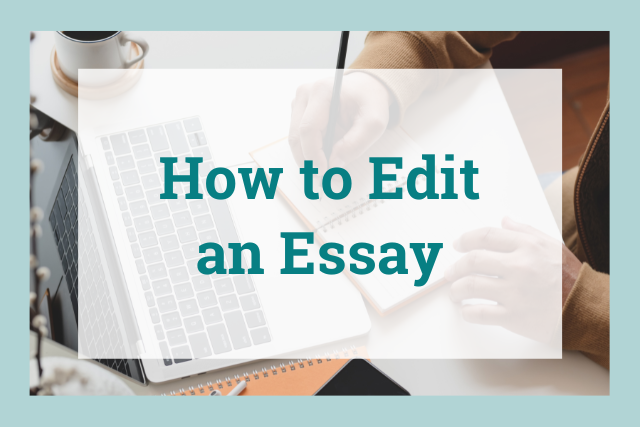
The work isn't done when you finish writing your essay. To get the best grade possible, you'll need to edit your paper.
Editing academic writing can be tricky, and good editing involves more than just running your work through an essay checker .
Here are our six top tips on how to edit an essay, so you can get a top grade every time.
How to Edit Your Essay
Where to find essay editing help.
Writing an essay is hard work! Once you put in time researching, outlining, and writing, you want to be sure to turn in a near-perfect essay.
Editing your essay to perfection can be done in just a few simple steps.
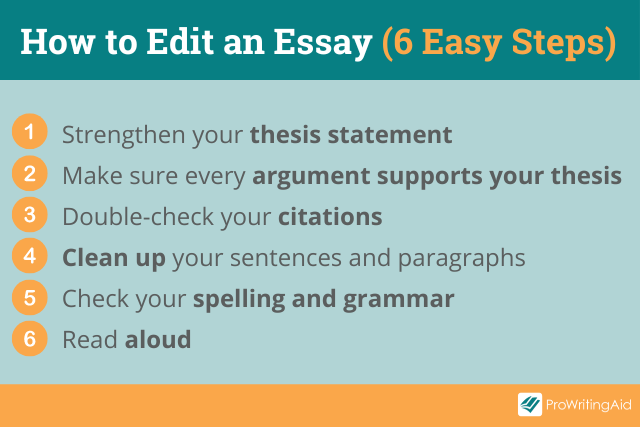
Strengthen Your Thesis Statement
The thesis statement is the backbone of your essay . You can think of your thesis statement as the answer to the question or prompt.
If someone asks, "What is your essay about?" the thesis statement would be the one or two sentence response to that question.
The thesis guides the rest of your paper. It's the main idea of your essay. Generally, a thesis statement is just one sentence. That's a lot of work for one little sentence to do in your essay.
When you edit, be sure your thesis statement is strong. A strong thesis will answer the prompt or guiding research question, but it will also be succinct. It should be clear, so eliminate any wordiness.
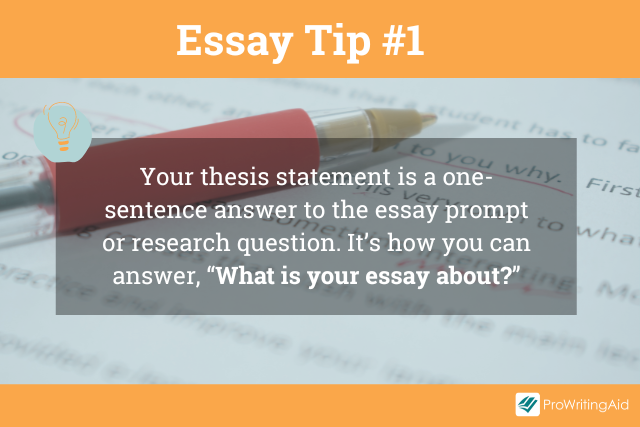
You should also ensure it aligns with the rest of the essay.
If you wrote your thesis at the beginning of your writing process, your essay might have taken a slightly different track from what you intended. If this is the case, adjust your thesis statement accordingly.
Note that a thesis can be longer than just one sentence, but this isn't typical for a regular term paper–style essay.
If your essay is much longer than average, or it's a write-up of an original experiment or study, you might need more than one sentence.
Your thesis also doesn't have to be a long sentence, although it can be. Rather than worrying about the length of your thesis, focus on whether it is clear and answers the question.
Make Sure Every Argument Supports the Thesis
Every argument or point in your essay should support the thesis statement. In essays, the main arguments make up the body paragraphs.
Sometimes, an essay draft might feature weak arguments or points that oppose the thesis. Perhaps you've included a paragraph that doesn’t fit the topic at all.
Edit without mercy. Look for weak or unnecessary arguments. As you analyze every point, ask yourself if it supports the thesis. If it doesn't, remove it entirely.
But what if cutting out a paragraph affects your word count? You should not have anything in your essay just to add words.
A well-developed and cohesive essay with a strong argument is always more important than hitting the requisite word count or page number.
In fact, if your essay is strong enough, your professors probably won't even notice if you're a hundred words shy. You will, however, lose marks for unnecessary information.
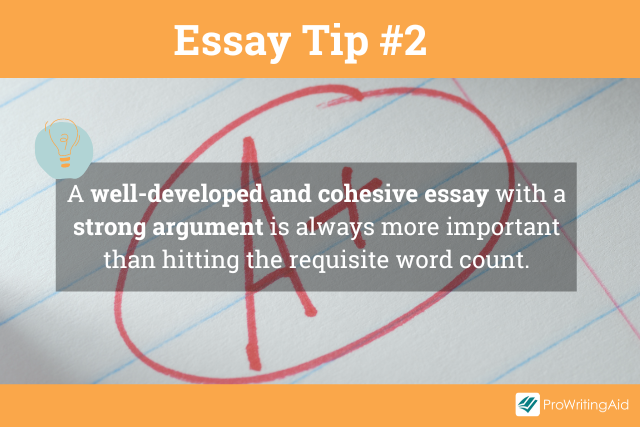
Double-Check Your Citations
Use citations to avoid plagiarism. When you write an essay, it's important that you attribute every fact or idea that you didn't come up with yourself. You must cite it whether it's a direct quote or a paraphrase.
Your professor probably gave you a specific style guide to follow, such as MLA or Chicago.
Not only do you need to be sure you've cited everything, you must cite properly according to the style guide.
Be sure you've added the appropriate spaces and correct punctuation to your in-text citations. Check requirements from your style guide.
Clean Up Your Sentences and Paragraphs
It's easy to add unnecessary words when you're writing. But when you're editing, you want to clean up anything that makes your writing feel wordy.
Being verbose isn't the best approach to writing an essay.
Students often fall into the trap of wordiness in order to sound "smart" or to reach the required number of words. But you'll sound smarter if you can explain your position with tighter sentences.
One area to look at is your connecting words . These are words that help you connect ideas and transition from one point to another.
Keeping transitions to one or two words is a good idea. Instead of saying, "as a further example," you can just say, "furthermore." Say "next" instead of saying, "The next argument is."
Unnecessary words also show up when you over-explain or repeat an idea. Are you saying the same thing with different wording?
Pay attention to your paragraph structure. A good paragraph structure for an essay is:
- A topic sentence
- A piece of evidence (quote or paraphrase)
- A fresh perspective on the evidence
- Closing sentence
You can also have more than one piece of evidence and commentary per paragraph. This general structure will help cut down on wordiness.
You don't need to quote something, paraphrase it , add commentary, and then reword that commentary. Say each thing once.
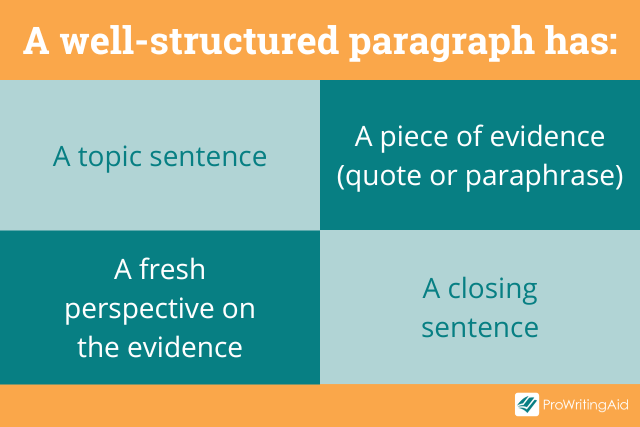
Check Your Spelling and Grammar
Spelling and grammar errors can make an otherwise great essay get a failing grade. Grammar mistakes affect how clear your writing is.
Don't feel bad if spelling and grammar aren't your strong suit. Many professional writers struggle with the mechanics of a language.
Read through your essay to look for obvious errors, then use an editing software to find more mistakes.
If your university has a writing center, you can also have someone look over your essay to find additional mistakes. This is usually a free service.
A final step you can use for editing your essay is reading it aloud. This technique is a great way to catch errors that slipped past you and an editing program.
You'll be surprised how many errors you can find when you read aloud a final draft. Often, these mistakes are typos, strange syntax, and missing words.
Reading aloud helps you find sentences that are unclear, even if they're grammatically correct.
ProWritingAid is here to help with all your essay editing needs. We're more than a grammar checker.
Our app will help you find unnecessary words, poor syntax, and transition issues. It will point out vague word choices, passive voice, and readability issues.
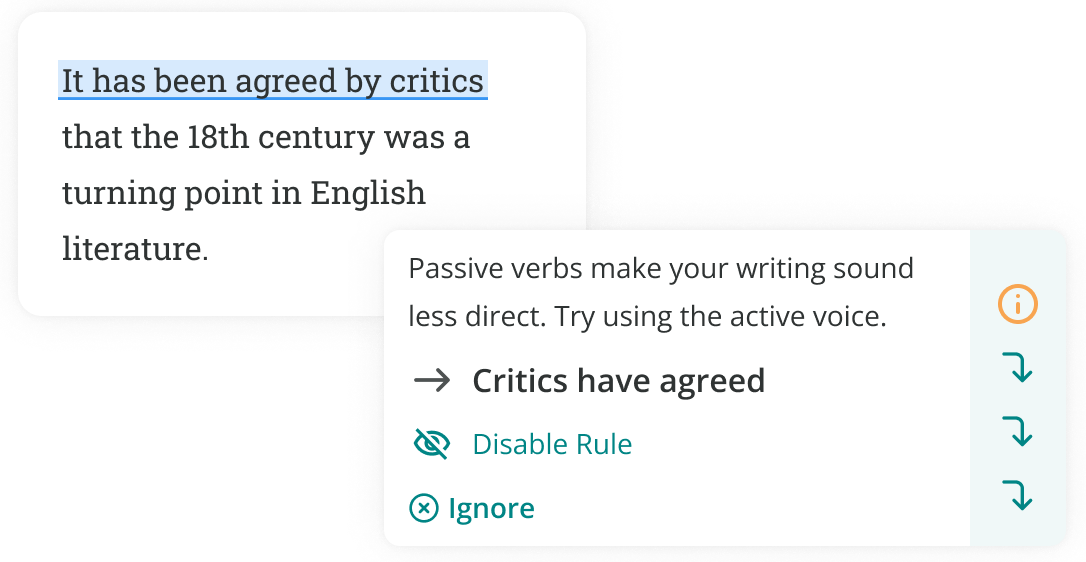
Unlike other editing programs, you get access to all of our editing reports for free. If you're worried about plagiarism, you can also run a plagiarism check on your essay for a nominal cost.
Want to improve your essay writing skills?
Use prowritingaid.
Are your teachers always pulling you up on the same errors? Maybe you're losing clarity by writing overly long sentences or using the passive voice too much.
ProWritingAid helps you catch these issues in your essay before you submit it.

Be confident about grammar
Check every email, essay, or story for grammar mistakes. Fix them before you press send.
Krystal N. Craiker is the Writing Pirate, an indie romance author and blog manager at ProWritingAid. She sails the seven internet seas, breaking tropes and bending genres. She has a background in anthropology and education, which brings fresh perspectives to her romance novels. When she’s not daydreaming about her next book or article, you can find her cooking gourmet gluten-free cuisine, laughing at memes, and playing board games. Krystal lives in Dallas, Texas with her husband, child, and basset hound.
Get started with ProWritingAid
Drop us a line or let's stay in touch via :
Essay Editing Fast, Affordable, Professional
Elevate your academic writing with our professional essay editing service designed for college students. Our expert editors refine and perfect your essays, addressing grammar, structure, and overall clarity, ensuring your papers meet the highest standards. Trust our dedicated essay editing service to enhance your writing skills, improve word count precision, and optimize citation accuracy, maximizing your chances of success, especially in crucial areas such as admission essays and test scores.
Try before you buy.
Get an instant quote. Services are available 24/7.
- Essay Editing
Essay Editing: Polish Your Essays to Perfection
As you wrap up that initial essay draft, it's always a good move to get a fresh perspective . Our essay editing service is here for you, delving into word choice, sentence flow, tone, and clarity. It's not just about fixing typos; we're like that second pair of eyes clearing up issues your busy instructor or friends might not catch.
Our experienced editors go beyond the surface, offering constructive comments to spruce up your arguments, bolster your paper's structure, and give you helpful tips. What's even better? You can follow along with every tweak, turning your editing experience into a chance to become a savvy writer. This service is perfect for college essays, applications, or any academic paper!
Elevate Your Essays with Our Expert Editing Services
At our essay editing service, we understand the importance of refining your written work to meet the highest academic standards . Our team of professional editors is dedicated to assisting college students in enhancing their writing. Whether you're working on a challenging academic paper, a college essay, or an application essay , our expert editors are here to provide meticulous editing services.
Our essay editing services encompass a comprehensive review of your paper, addressing critical elements such as word choice, sentence structure, and overall clarity. We go beyond mere proofreading, offering valuable insights to strengthen your arguments and improve the organization and structure of your essays. With a focus on helping students achieve excellence, our dedicated team of editors ensures that your writing not only meets but also exceeds academic expectations.
From polishing college essays to refining application essays for admission, our essay editing services are designed to elevate your writing skills . We also understand the significance of maintaining proper citation styles (e.g., APA , MLA , Chicago , and Turabian ), ensuring your essays are not only well-written but also adhere to academic standards.
Professional editing and proofreading are now even more affordable!
With Scribendi's 10% student discount, you can take your documents to the next level. Our expert editors can enhance your essays, research papers, assignments, and personal documents with ease. Simply use the coupon code on our Student Discount page to start improving your writing today. Don't miss out on this limited time offer!
What will you receive with Essay Editing?
- An edited copy of your document in which the typos, spelling errors, and grammar errors have been corrected
- Tracked revisions so that you can see and review all the changes that have been made
- Comments noting issues or concerns with the document
- Suggestions to help improve the writing and the content
- A short summary of the work that has been done and any major concerns
What types of documents can you use Essay Editing for?
- Essays, term papers, and research papers
- Reports and compositions
- Written assignments
- Note: Scribendi does not write or compose papers for students.
- Note: Scribendi does not paraphrase quotations or rewrite sentences to avoid plagiarism.
Generative AI has become increasingly relevant in academia and can impact academic services at Scribendi; click here to see Scribendi’s policy on generative AI .
We can handle most file types and subjects, and we make sure your work is kept confidential and your personal information is kept private . Uploads and downloads are safe and securely encrypted .
Let's perfect your essay— get an instant quote below so that you can place your order today !
Looking for other student services ? We also offer an Essay Proofreading Service as well as admissions-specific services, including Admissions Editing and Admissions Proofreading .
Get an Instant Quote and Place Your Order
| File | Word Count | Include in Price? |
|---|
| Student Essay Editing | (up to 1,500 words) | ||
| Student Essay Editing | (up to 4,000 words) | ||
| Student Essay Editing | (up to 6,000 words) | ||
| Student Essay Editing | (up to 10,000 words) | ||
| Student Essay Editing | (up to 25,000 words) | ||
| Student Essay Editing | (up to 40,000 words) | ||
| Student Essay Editing | (up to 65,000 words) |
Essay Editing FAQs
What is the difference between essay editing and essay proofreading.
Essay editing involves a comprehensive review of your writing for clarity, coherence, and structure, ensuring it meets academic standards. Our professional essay editors refine content, address language nuances, and enhance overall quality. On the other hand, essay proofreading focuses on eliminating errors in grammar, spelling, and punctuation, ensuring flawless execution. Both services cater to college students, offering valuable support in crafting polished, impactful essays, whether for admissions, academics, or personal statements . Our essay editing service goes beyond proofreading, elevating your writing to the highest standards and maximizing your chances of success.
Can I pay someone to edit my essay?
Certainly! Our essay editing service allows college students to pay for professional editors who enhance writing quality, address structure, and ensure clarity. Our expert editors refine your essay, offering personalized assistance for academic excellence, whether it's a college essay, personal statement, or application essay. With a focus beyond proofreading, we elevate your writing skills, ensuring your paper meets the highest standards. Trust our professional essay editing service to optimize your word count, address citation requirements, and maximize your chances of success, especially when test scores and admission essays are crucial.
Where can I edit my essay for free?
While our professional essay editing service isn't free, we offer a comprehensive solution for college students seeking top-notch editing. Our expert editors refine writing, addressing structure, clarity, and language nuances. While there are free tools online, they often lack the personalized touch and depth our service provides. Invest in your academic success with our essay editing service, tailored for university standards, ensuring your essay, whether a college essay, personal statement, or application essay, meets the highest quality. Trust our professional editors to elevate your writing and enhance your chances of success.
What does the essay editing service include?
Our essay editing service offers a comprehensive review for college students, including refining writing, addressing structure, enhancing clarity, and ensuring language proficiency. Our expert editors go beyond proofreading, optimizing word count and utilizing writing skills to meet academic standards. Whether it's a college essay, personal statement, or application essay, our professional essay editing service provides tailored assistance. From polishing language to addressing citation requirements, our service aims to elevate your writing quality for academic success. Trust our experienced editors to maximize your chances, especially when test scores and admission essays are critical.
- Link to facebook
- Link to linkedin
- Link to twitter
- Link to youtube
Essay Editing Services
Expert Academic Proofreading

Exceptional Essays, Excellent Results
Throughout your university studies, you may have to write a lot of essays. Each one is a chance to showcase your ideas and the research you have done. But to ensure you get the marks you deserve, your writing needs to be clear, concise, and error free. And that’s where our essay proofreading service comes in.

Expert Editor

Expert Essay Proofreaders
Our team of professional proofreaders has helped thousands of students refine their academic writing. And with our extensive editing experience, we are perfectly equipped to help you prepare a first-rate essay.
Make sure your writing is the best it can be with our expert English proofreading and editing
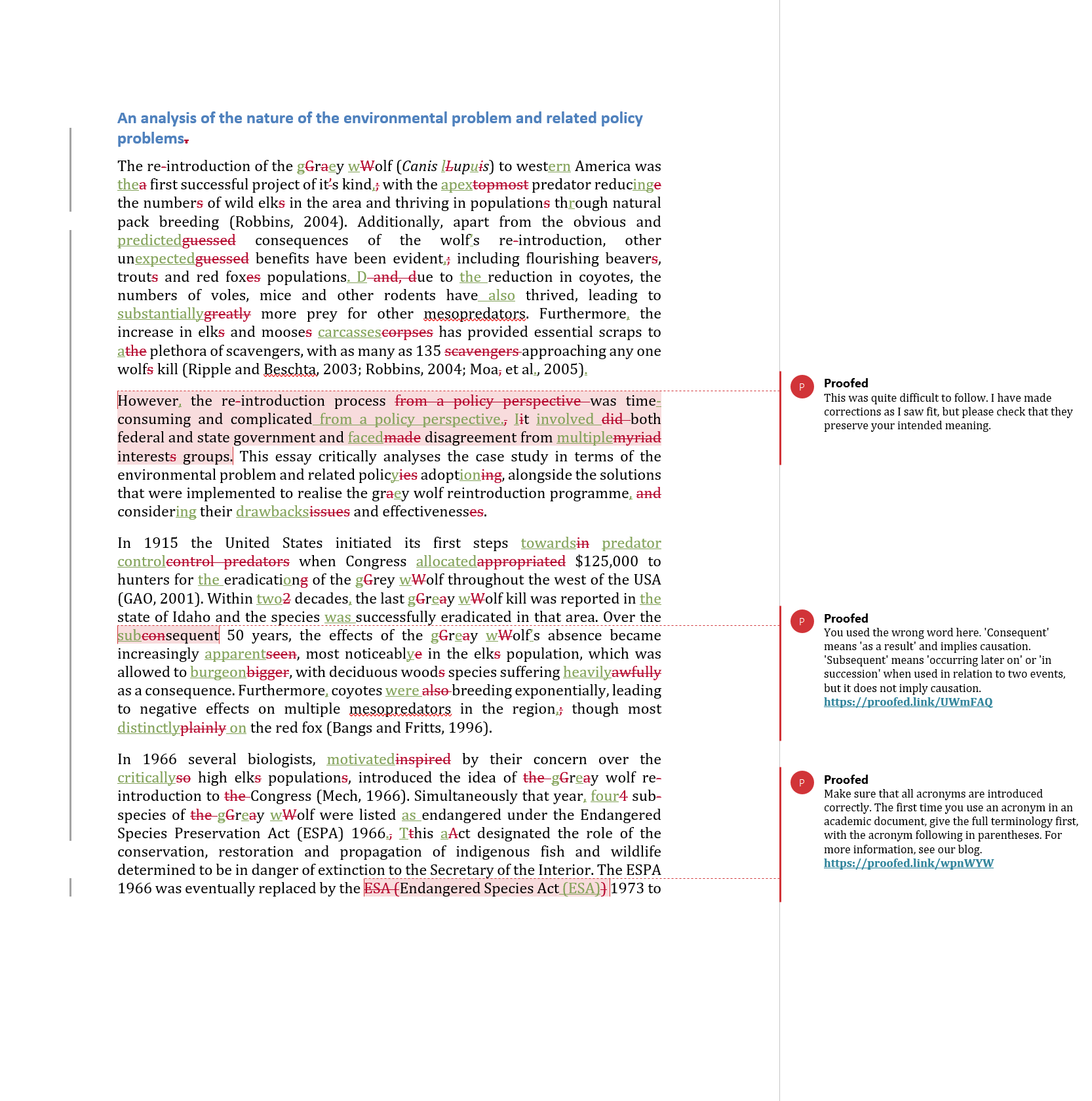
Essay Proofreading And Editing
When you submit a document, one of our expert essay proofreaders will:
- Ensure punctuation, spelling, and grammar are correct
- Refine sentence structure to ensure your writing reads smoothly
- Highlight any inconsistencies or unclear text
- Check that your tone and vocabulary are suitably academic
- Flag issues with citations or references
After this, we will provide two copies of your edited essay:
- A ‘Clean’ copy in the original file format
- An MS Word Track Changes copy
You can use this Track Changes copy to review every edit we make, so you are always in control of the final draft. And if your chosen file type doesn’t support Track Changes, we will adapt our process to match.
If you are writing an essay for university, we will always follow academic plagiarism guidelines when we proofread your document. This protects your academic integrity, allowing you to submit your work with confidence.
However, we also offer a full editing service for non-student documents, so we may still be able to help if you have an essay that needs more work. Just let us know your situation and we’ll see what we can do.
Lightning-Fast Delivery
You’ll never miss a deadline with our speedy services: our Next-Day Guarantee means we’ll return any document up to 10,000 words long within 24 hours
And if you need a faster turnaround, simply select your desired delivery speed when you submit your document. We have three options:
We can also meet custom deadlines! Just let us know what you need.
*For documents up to 8,000 words
**For documents up to 3,000 words
How We Work With Students
You’ll never miss a deadline with our speedy services: our Next-Day Guarantee means we’ll return any document up to 8,000 words long within 24 hours.
We can also meet custom deadlines! Just let us know what you need.
* For documents up to 8,000 words
** For documents up to 3,000 words
Great Pricing
Our pricing is affordable and transparent – the cost is based on the exact length of your document. Check out our pricing calculator for an instant quote, and rest assured that you’ll receive the highest quality proofreading and editing for the best value on the market.
Referencing Expertise
Our editors are experts in various referencing styles, including but not limited to APA, Harvard, MLA, Chicago, and IEEE. No matter what style you’re using, they’ll make sure your citations and references are correct and let you know if any information is missing. Visit our referencing page to learn more.
Subject-Matter Experts
Our team includes over 750 professional editors with expertise in thousands of topics. This means we can always match you with the best proofreader for your writing, whether you need help with a dissertation in medicine or an essay on economics.
24-Hour Support
Our support team is available around the clock to address any concerns or questions you have about your order. This means you’ll never be left in the dark, no matter where you are or what time it is.
Instant Quote
You can also upload a document to get an instant quote
Drag & drop your file
or browse your computer
Browse from your device
Drop your file here!
Your file is being uploaded!

Looking For A Proofreading Partner?
Let’s talk about the support you need.

Writing Lab
Writing your paper.
- Topic of Paper
- Brainstorming
Revising and Editing Tutorial
Editing checklist, revision video.
- Proofreading
Revising and editing ensure a paper communicates its message effectively. This process involves examining the content, structure, and mechanics of writing. Revising focuses on coherence, logical flow, and organization. Editing refines language use, such as word choice, sentence structure, grammar, and punctuation. Considering these aspects, revising and editing enhance the paper's quality, making it more compelling and readable.
This detailed tutorial emphasizes the importance of revising and editing, highlighting how they significantly improve a paper's coherence, organization, and language use, thus making it more compelling and readable.
Revising and Editing opens a new window
When you revise or edit a paper, focus on the ideas, organization, grammar , spelling, and punctuation .
Check ideas and organization
- Is my thesis statement concise and clear?
- Did I follow my outline?
- Are my arguments presented in a logical sequence?
- Are all of the items in my reference page cited in my text?
- Are all of the items cited in my text in my reference page?
- Did I use the proper APA style?
- Have I proved my thesis with strong supporting arguments?
- Have I made my intentions and points clear in the essay? Are my arguments well-supported and well-reasoned? Did I have another reader review my paper?
Check grammar, spelling, and punctuation
- Are there ideas I could express more concisely and in fewer words?
- Do subjects and verbs agree?
- Do pronouns and their antecedents agree in number and gender?
- Words such as there, they're, and their are commonly misused. Did I use the correct forms?
- Did I avoid writing with I and you for an academic paper?
- To avoid repetition, I should vary the beginnings of my sentences. Did I avoid starting two sentences with the same word in the paragraph?
- Did I use transition words when moving from one concept to the next? These are words like: first, second, then, however, therefore, in addition...
- Did I check for spelling?
- << Previous: Drafting
- Next: Proofreading >>
- Last Updated: Jun 18, 2024 2:06 PM
- URL: https://guides.rasmussen.edu/writingpaper
By continuing to browse the site you are agreeing to our use of cookies and similar tracking technologies described in our privacy policy .
Jonathan S. Jones
Students Critique a ChatGPT Essay
A Classroom Experiment
/ Article Archive
/ Students Critique a ChatGPT Essay
Publication Date
September 7, 2023
Perspectives Section
Perspectives Daily
Undergraduate Education
Digital Methods, Teaching Methods
Historians today find ourselves on the bleeding edge of the artificial intelligence (AI) revolution. It feels like generative AI is everywhere these days, even in places where it’s not welcome. Chatbots like Open AI’s ChatGPT have made disruptive appearances in law , real estate , Hollywood , and of course the classroom, offering up simultaneous promise and peril. While Bill Gates described AI as the “most important tech advance in decades,” many tech visionaries (including Gates), AI developers, and even the White House have called urgently for guardrails on AI’s breakneck development.
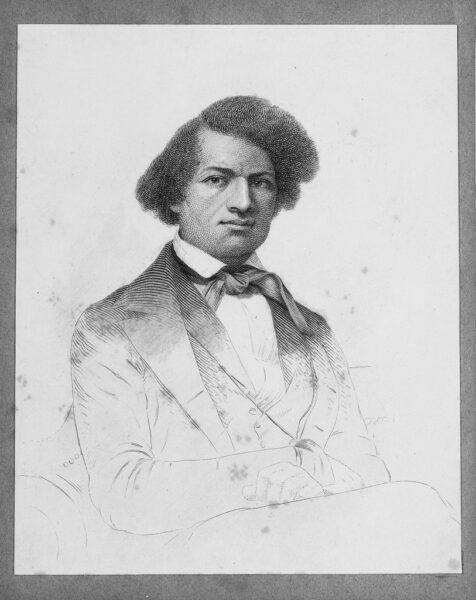
A ChatGPT essay on Frederick Douglass turned out much like this engraving: the outlines were there, but details were missing. Library of Congress/public domain
The meteoric rise of chatbots raises questions that, if left unanswered, put history educators in a bind. How can we meaningfully teach historical skills like writing and argumentation if our students can have ChatGPT draft an essay for them in seconds? And how can we assess our students’ understanding of course content if ChatGPT can conjure up instant answers to essay prompts with no learning required? Unsurprisingly, universities, departments, and individual instructors are in a mad scramble to formulate AI policies addressing these urgent questions.
When I first encountered ChatGPT shortly after its November 2022 launch, I admittedly felt a knee-jerk impulse to ban it and forget about it. Like many of my colleagues, I was deeply worried about its potential for academic dishonesty (and I still am). But it was obvious that AI is here to stay. More importantly, as I practiced using ChatGPT, I realized that effective AI use is a learned skill, one today’s students desperately need to learn as chatbots proliferate. If we envision history courses as opportunities to teach the historian’s skill set, we would do well to incorporate new technology like AI into our courses. So, I decided to figure out how I could effectively use ChatGPT in the classroom for my students’ benefit.
Conversations with my students about the chatbot revealed their curiosity about both its uses and limitations . So, I created a classroom experiment to test ChatGPT’s ability to generate authentic, accurate historical essays. I chose to do this experiment live and in person in a spring 2023 upper-level undergraduate history course, but the exercise could also work as a take-home assignment. This particular class, Frederick Douglass’s America, familiarizes students with the life and times of the famous 19th-century abolitionist and introduces the historical research skills that students will need to complete an undergraduate capstone. As we were approaching the semester’s midpoint, I also designed the exercise as an opportunity for students to reflect on what they had learned about Douglass’s life thus far.
Effective AI use is a learned skill, one that today’s students desperately need.
To that end, I asked ChatGPT to “write me an essay about Frederick Douglass and the Civil War.” The program generated a relevant, if basic, biographical sketch of Douglass without “ hallucinating ” any fake information, a notorious shortcoming of ChatGPT. The essay lacked an argument or references, but I didn’t ask for either, so no harm done. Then I graded the essay, which earned a D by my rubric.
Next, I shared the essay with students via Google Docs. (It can be read in full here , along with the lesson plan.) In groups, I asked them to read the essay and identify any sections that needed editing—additions, deletions, or revisions. For 20 minutes, students tackled this assignment in groups and focused on a theme of their choice: Douglass’s life under slavery, his wartime experiences, or his Reconstruction-era activism. Students added their responses in the document using comment bubbles.
Finally, we debriefed. I asked students to describe a factual error they identified and an edit they made to correct or contextualize the essay. Then I asked students to reflect on their biggest takeaway.
This exercise was a smash hit, with terrific student engagement and clear payoffs. Students jumped at the chance to showcase the knowledge they had learned in class to fact-check the essay. Ultimately, they made a few deletions, some additions, and, most importantly, used their higher-order thinking skills to evaluate the essay and add much-needed context to its key points. For example, where ChatGPT matter-of-factly stated that Douglass was born in 1818, students observed that, like many enslaved African Americans, Douglass spent most of his life without knowing his birthdate. This and other legacies of slavery are all too often overlooked by chatbots, which lack contextualization and fine-tuned historical research skills.
Students jumped at the chance to showcase the knowledge they had learned in class to fact-check the essay.
Instead of merely regurgitating information on a midterm exam, students enjoyed probing the limits of what ChatGPT can realistically do—and not do—hopefully disincentivizing future academic misconduct. In their reflections during the debrief, students described how ChatGPT generates essays that seem human-produced and authoritative, but the significant factual errors and lack of analysis in its text often make a poor substitute for how students themselves have learned to write. They also sharpened their writing and editing skills in an engaging activity that felt more pragmatic than a midterm exam.
I learned a lot from this exercise too, which can be adapted readily for a variety of course formats. I came away recognizing that if I had given into the initial impulse to ban ChatGPT, my students would have been robbed of a crucial learning experience to prepare for a world that is rapidly embracing AI. Instead, by incorporating the chatbot into the classroom, my students gained a better understanding of what AI can (and can’t) do, while also sharpening their historical skills and applying their content knowledge.
After all, AI is not disappearing anytime soon, and our students are already using it. Many historians likewise have embraced digital literacy as one of the most essential skills we can teach students, but if educators bury our heads in the sand and attempt to ban AI from the classroom, crucial learning opportunities are lost. So why not bring AI into the classroom and harness its potential to reinforce historical skills and content?
Jonathan S. Jones is an assistant professor at James Madison University. Find him on X (formerly Twitter) @_jonathansjones.
Related Articles

June 4, 2024
Perspectives Daily Summer Columnists">Meet the 2024 Perspectives Daily Summer Columnists

June 3, 2024
Announcing the 2024–25 NASA Fellows

May 30, 2024
Thinking Globally about Student Protest
Join the aha.
The AHA brings together historians from all specializations and all work contexts, embracing the breadth and variety of activity in history today.
Advertisement
Supported by
Biden to Give Legal Protections to Undocumented Spouses of U.S. Citizens
Undocumented spouses of American citizens will be shielded from deportation, provided work permits and given a pathway to citizenship, according to officials briefed on the plan.
- Share full article

By Zolan Kanno-Youngs
Reporting from Washington
President Biden on Tuesday will announce sweeping new protections for hundreds of thousands of immigrants who have been living in the United States illegally for years but are married to American citizens, officials familiar with the plan said.
Mr. Biden will detail the policy at the White House on Tuesday while marking the 12-year anniversary of the Deferred Action for Childhood Arrivals, or DACA, which protects people who came to the United States as children from deportation, the officials said. They spoke on the condition of anonymity to discuss a policy that had not been formally announced.
Under the policy, undocumented spouses of U.S. citizens will be shielded from deportation, provided work permits and given a pathway to citizenship. Officials briefed on the conversations said it could affect up to 500,000 undocumented spouses, although the exact scale of the program remained unclear.
The White House did not immediately respond to a request for comment.
Marrying an American citizen generally provides a pathway to U.S. citizenship. But people who crossed the southern border illegally — rather than arriving in the country with a visa — must return to their home countries to complete the process for a green card.
That means long separations from their spouses and families. The new program would allow families to remain in the country while they pursue legal status.
Officials briefed on the discussions said the announcement could amount to the most sweeping unilateral move by a president to provide relief to unauthorized immigrants since President Barack Obama implemented DACA. In a separate move on Tuesday, Mr. Biden is also expected to announce new ways to help people in DACA, known as Dreamers, gain access to work visas.
We are having trouble retrieving the article content.
Please enable JavaScript in your browser settings.
Thank you for your patience while we verify access. If you are in Reader mode please exit and log into your Times account, or subscribe for all of The Times.
Thank you for your patience while we verify access.
Already a subscriber? Log in .
Want all of The Times? Subscribe .
Enhancing Post-Editing Machine Translation Skills Among Iraqi Undergraduate Students
AWEJ for Translation & Literary Studies, Volume 8, Number 2 May 2024 Pp. 165-182
18 Pages Posted: 17 Jun 2024
Huda Saad Al Sammarraie
Mustansiriyah University
Mozhgan Ghassemiazghandi
Universiti Sains Malaysia (USM) - School of Languages, Literacies and Translation
Date Written: June 14, 2024
Post-editing machine translation often results in discrepancies between industry expectations and the actual quality of the final product. Despite the usually, low-quality outcomes associated with machine translation, it remains underutilized, even when there are opportunities for improvement through post-editing jobs. This study focuses on the impact of technology-assisted training on English proficiency among students. It investigates a standard error observed among Iraqi students during the post-editing of machine translations using Google Translate deciding whether to edit the machine translation output or to translate from scratch and understand the source text. This research involved 20 undergraduates from Al-Mustansiriyah University and employed a mixed methods approach, collecting data through an online questionnaire completed by students in the undergraduate translation program. The findings indicate a significant improvement in the frequency of post-editing skills among Iraqi students, serving as a distinguishing factor between the two groups. It also highlighted differences in translation abilities among students in Iraqi higher education, with notable improvements observed in the experimental group. In summary, this study supports previous research from the last five years, indicating a more favourable attitude toward machine translation and suggesting that post-editing is considered an essential sub-competency in translation education.
Keywords: Machine Translation, post-editing, Technology-Assisted Training, translation education, translation technology
Suggested Citation: Suggested Citation
Huda Saad Al Sammarraie (Contact Author)
Mustansiriyah university ( email ), universiti sains malaysia (usm) - school of languages, literacies and translation ( email ), do you have a job opening that you would like to promote on ssrn, paper statistics, related ejournals, pedagogy ejournal.
Subscribe to this fee journal for more curated articles on this topic
Linguistic Anthropology eJournal
Cognitive psychology ejournal, arab world english journals.
Subscribe to this free journal for more curated articles on this topic
Political Economy - Development: Public Service Delivery eJournal
- DOI: 10.1021/acssynbio.4c00157
- Corpus ID: 270489592
CRISPR/Cas9-Based Genome Editing for Protein Expression and Secretion in Kluyveromyces lactis.
- Lingtong Liao , Xiuru Shen , +3 authors Guoqiang Zhang
- Published in ACS Synthetic Biology 13 June 2024
- Engineering, Biology
38 References
Efficient crispr–cas9 mediated multiplex genome editing in yeasts, genome editing in kluyveromyces and ogataea yeasts using a broad-host-range cas9/grna co-expression plasmid, a crispr-cas9 system-mediated genetic disruption and multi-fragment assembly in starmerella bombicola., efficient multiplexed integration of synergistic alleles and metabolic pathways in yeasts via crispr-cas., construction of a kluyveromyces lactisku80− host strain for recombinant protein production: extracellular secretion of pectin lyase and a streptavidin–pectin lyase chimera, recombination machinery engineering facilitates metabolic engineering of the industrial yeast pichia pastoris, easyclone‐markerfree: a vector toolkit for marker‐less integration of genes into saccharomyces cerevisiae via crispr‐cas9, efficient gene targeting in kluyveromyces lactis, the biological principles and advanced applications of dsb repair in crispr-mediated yeast genome editing, disruption of pmr1 in kluyveromyces lactis improves secretion of calf prochymosin., related papers.
Showing 1 through 3 of 0 Related Papers
Academic Proofreading & Editing Services
Improve your chances of getting published.
Whether you're writing a dissertation, manuscript, paper, or proposal, you want your ideas and research to shine without your writing getting in the way.
- Ensure your arguments are judged on merit
- Lift the quality of your paper as a whole
- Make you stand out from your peers

- Proofreading & Editing
Native editors
Same day delivery
100% happiness guarantee
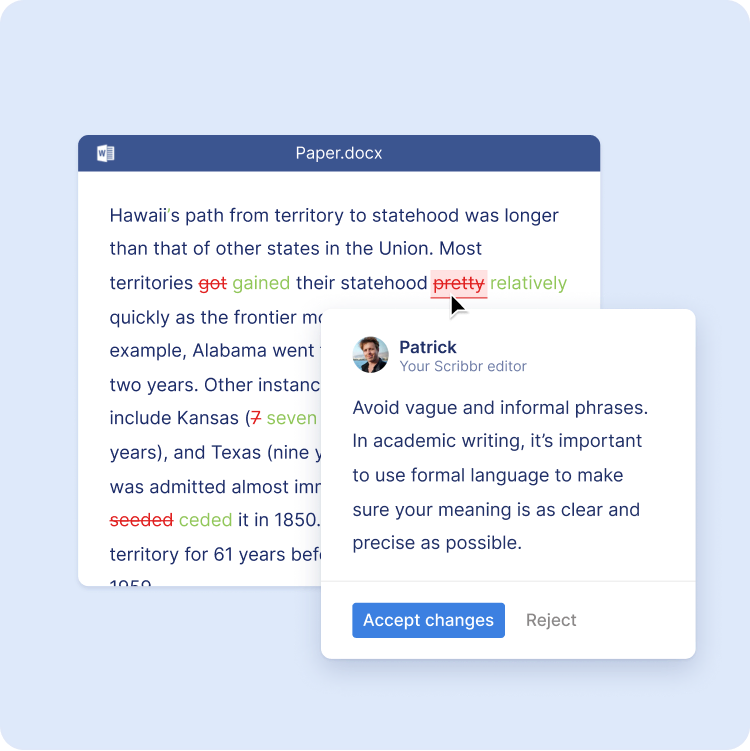
Get your academic writing back, free of language errors and inconsistencies
Standard Proofreading & Editing is perfect if you’re confident about your writing but need a second pair of eyes to catch:
- Spelling and grammar errors
- Inconsistencies in dialect
- Overuse of passive voice
- Subjective or inflated language
For a more comprehensive edit, you can add one or multiple add-on editing services that fit your needs.
| ⏰ Deadline | Same day delivery |
|---|---|
| 📄 Texts | Papers, essays, dissertations, manuscripts |
| ⭐️ Rating | based on 13,224 reviews |
Add-on services
Customize your editing package to get the help you need, structure check, clarity check, paper formatting, citation editing.
Ensures sections and chapters are structured and focused and your writing is free of redundancies.
- Through in-text feedback, your editor will help:
- Organize and focus individual chapters and sections
- Eliminate repetitive and redundant information
- Perfect transitions between sentences and paragraphs
- Align titles and headings with the section’s content
You’ll also receive a personalized Structure Check Report meant to help you identify missing elements in each chapter or section and prioritize improvements.
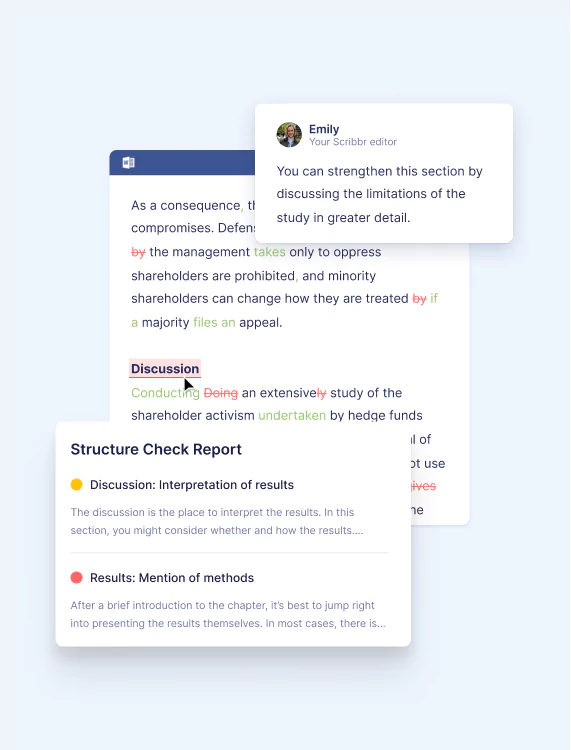
Ensures ideas are presented clearly, your arguments are consistent, and your audience can follow along.
Through in-text comments and checklists, your editor will:
- Make sure your text tells a clear and logical story
- Check that you’ve clearly presented concepts, ideas, and key terms
- Make sure your key takeaways and conclusions are front and center
- Highlight contradictions within the text
- Ensure you’re keeping your audience’s needs in mind
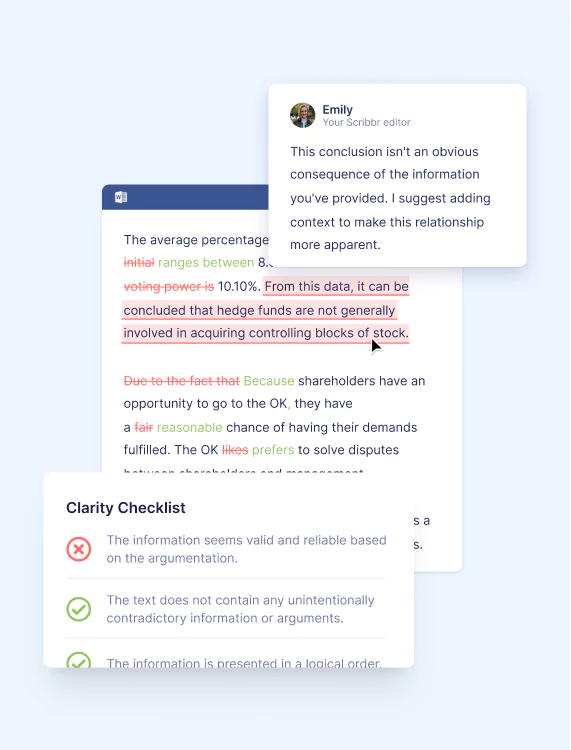
Ensures a professional look for your document that meets your formatting requirements.
Your formatting expert will ensure consistency for the following:
- Margins, spacing, and indentation
- Body text and headings
- Page numbers
- Abstract and keywords
- Explanatory footnotes
Choose our Paper Formatting service for a professional finish or our APA Editing Service for the most up-to-date APA formatting.
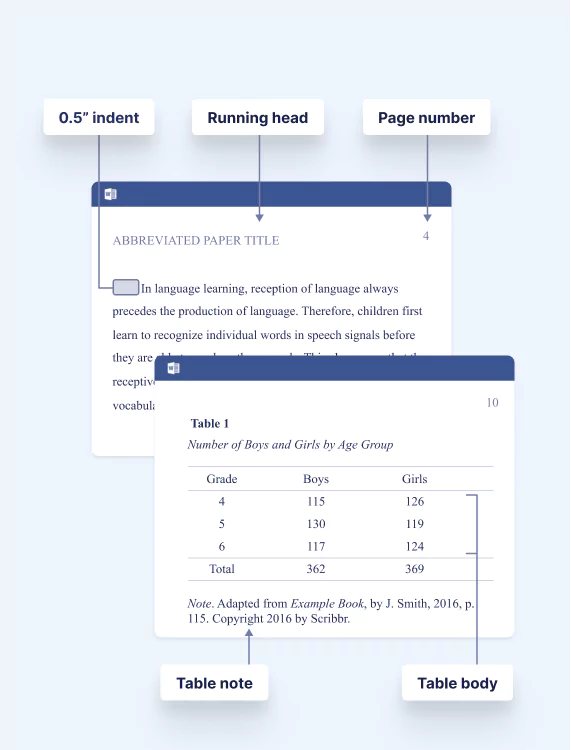
Citation Editing ensures your citations and references are consistent and meet your style guide’s requirements.
After you provide your document with a reference list, your citation expert will:
- Format the layout of your reference page (margins, indents, spacing)
- Ensure that your chosen citation style is applied consistently according to the guidelines
- Cross-check citations with reference entries
- Provide feedback on reference list entries that you need to complete due to missing information
Your expert is familiar with all common citation styles. Find more information about the service and our requirements in our FAQs .
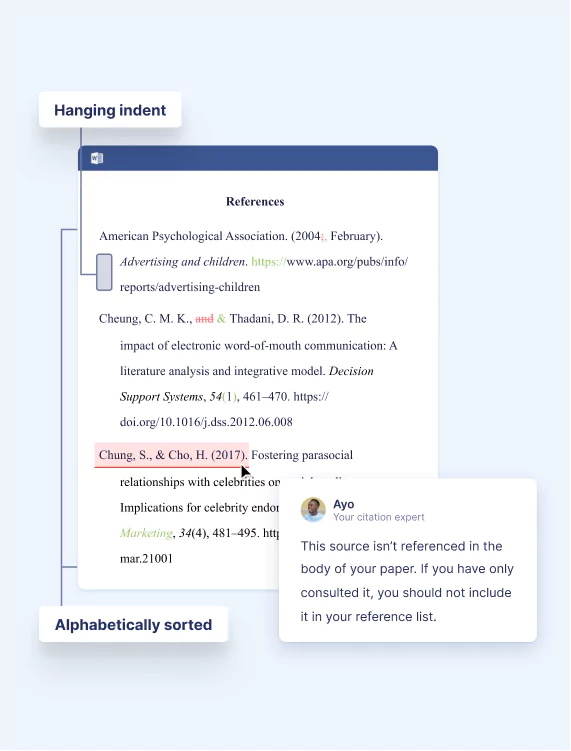
Get matched to the perfect editor - or editing team
At Scribbr, you can rest assured that only the best editors will work on your paper.
All our 800+ editors have passed the challenging Scribbr Academy, which has a passing rate of only 2%.
We handpick your editor based on several criteria, including field of study and document type. And we’ll even expand your team with citation and formatting experts if needed.

I have a doctorate in biology and studied a range of life science subjects. I specialize in editing academic texts.

I researched at Harvard, taught English with a Fulbright in Peru, and earned a master's from Johns Hopkins.

I am an academic editor and book reviewer. I am familiar with many style guides and have edited over 6 million words.

I have a bachelor's in electrical engineering and a master's in psychology and am pursuing a PhD in neuroscience.

I am an ESL teacher and academic editor with a research background in the humanities, arts, and culture.
Polish your writing to perfection with expert editing
This deadline works automatically for the following document sizes:
- 3 hours: less than 3,000 words
- 6 hours: less than 6,000 words
- 12 hours: less than 12,000 words
Select your currency
“Excellent Experience!”
I requested a 7 day turn around of my 111 page dissertation. The Scribbr editors provided professional edits, comments, and recommendations to assist me in drafting the final version of my paper. The Scribbr team gain my trust and made this daunting process quite seamless. I would highly recommend Scribbr to anyone in need of the many services Scribbr provide. Thank you Deb and Emma for your patience with my review. I am 100% satisfied.
How it works
Stay in control throughout the paper editing process, upload any time.
Upload your document and easily select the pages that need editing. Next, choose your turnaround time and services and explain your situation and needs to the editor.
Stay in the loop
After placing your order you can keep track of our progress. From finding your perfect editor to potential hand-overs to formatting or citation experts.
Revise and submit
You’ll receive back your document with tracked changes and feedback as well as a personal letter from your editor. The last step is submitting your work with confidence!
Scribbr & academic integrity
Scribbr is committed to protecting academic integrity. Our proofreading service, our AI writing tools ( plagiarism checker , paraphrasing tool , grammar checker , summarizer, Citation Generator ) as well as our free Knowledge Base content are designed to help students produce quality academic papers.
We make every effort to prevent our software from being used for fraudulent or manipulative purposes.
Your questions, answered.
Yes, if your document is longer than 20,000 words, you will get a sample of approximately 2,000 words. This sample edit gives you a first impression of the editor’s editing style and a chance to ask questions and give feedback.
How does the sample edit work?
You will receive the sample edit within 12 hours after placing your order. You then have 24 hours to let us know if you’re happy with the sample or if there’s something you would like the editor to do differently.
Read more about how the sample edit works
Yes, we can provide a certificate of proofreading.
As soon as the editor delivers the edit, you can email us at [email protected] to request a certificate.
Please indicate the following in your email:
- Your order number
- Your full name
- The title of your work
We will create a PDF certificate and email it to you as soon as possible.
The fastest turnaround time is 12 hours.
You can upload your document at any time and choose between four deadlines:
All Scribbr editors are language experts with interests in different subject areas.
You can indicate your field of study when you upload your document . We’ll make sure that the editor who proofreads your work is familiar with your discipline and its specialist vocabulary.
These are the fields of study you can choose from, and examples of the main subjects in each field:
- Business and Management: Business Administration, Hotel Management, Accountancy, Marketing
- Economics: Business Economics, Econometrics, Finance
- IT and Engineering: ICT, Computer Science, Artificial Intelligence, Applied Mathematics, Civil Engineering, Industrial Design, Electrical Engineering
- Natural and Life Sciences: Biomedical Sciences, Biology, Chemistry
- Geography, Agriculture and Environment: Ecology, Earth Sciences, Environmental Studies, Urban Planning
- Health and Medical Sciences: Medicine, Obstetrics, Pharmacy, Nutrition, Dentistry
- Arts and Humanities: Philosophy, History, Literature, Cultural Studies, Theology
- Law and Policy: Law, Political Science, Public Policy, Human Rights
- Social and Behavioral Sciences: Psychology, Sociology, Anthropology, Communication Sciences
Editors don’t have to be experts in the content of your paper, but they do know how to present it in the best way possible! Our goal is to improve your writing and give you feedback on the readability, structure, logic, and clarity of your text. We know from experience that the most effective editors are specialists in language and academic writing.
We’ve carefully selected and trained all of our editors to proofread theses and other academic documents. Once they’re qualified, we continue to carefully monitor their work to make sure we always deliver the highest quality .
Get in touch, with real people
We answer your questions quickly and personally from 9:00 to 23:00 CET

- Start live chat
- Email [email protected]
- Call +1 (510) 822-8066
- WhatsApp +31 20 261 6040
Knowledge Base
Improving your writing skills with scribbr’s top-rated guides.
Academic Writing
Language Rules to Improve Your Academic Writing
What is academic writing, english mistakes commonly made, common word choice confusions in academic writing.

IMAGES
VIDEO
COMMENTS
Make sure that you complete the most important editing and proofreading tasks. Editing. Editing is what you begin doing as soon as you finish your first draft. You reread your draft to see, for example, whether the paper is well-organized, the transitions between paragraphs are smooth, and your evidence really backs up your argument.
2. Prune long sentences and paragraphs. Whether you've exceeded your word count or not, long sentences and paragraphs should be edited because they can be trickier to read, and risk being boring or hard to follow. Try, therefore, to keep sentences to a maximum of two or three clauses (or segments). Avoid long paragraphs by starting a new one ...
Have a fresh pair of eyes give you some feedback. Don't allow someone else to rewrite your essay, but do take advantage of others' edits and opinions when they seem helpful. ( Bates College) Read your essay aloud to someone. Reading the essay out loud offers a chance to hear how your essay sounds outside your head.
Revising and editing an essay is a crucial step of the writing process. It often takes up at least as much time as producing the first draft, so make sure you leave enough time to revise thoroughly. Although you can save considerable time using our essay checker. The most effective approach to revising an essay is to move from general to specific:
Developmental editing (i.e. content editing, substantive editing) This is the first step of the editing process and applies to very early drafts. The editor helps you structure your ideas, decide what story to tell and find direction for your writing. No. This kind of editing involves heavy rewriting and restructuring. Our editors cannot help ...
Essay Editing Tip #4: Use a Highlighter. Your writing skills can catapult if you start using some old-fashioned methods of self-editing. Old school writers always walk around with a highlighter in their hands. Highlighting is a great way to focus on individual sentences and vigorously proof check them.
The four editing levels are: Proofreading: usually the "last pass" before submission or publication; ensuring everything is correct and no lingering errors such as typos, missing words, missing punctuation, etc. remain. In general, writers should follow this list down in order when revising and editing, from higher order to lower order concerns ...
Here's what a professional editor looks for in your essay: 1. Errors in spelling and grammar: This includes ensuring subject-verb agreement, conducting spellchecks on commonly misspelled words, or even maintaining consistency in the tense of your essay. 2. Errors in the use of technical terms:
Come up with a thesis. Create an essay outline. Write the introduction. Write the main body, organized into paragraphs. Write the conclusion. Evaluate the overall organization. Revise the content of each paragraph. Proofread your essay or use a Grammar Checker for language errors. Use a plagiarism checker.
How to Edit Your Essay. Writing an essay is hard work! Once you put in time researching, outlining, and writing, you want to be sure to turn in a near-perfect essay. Editing your essay to perfection can be done in just a few simple steps. Strengthen Your Thesis Statement. The thesis statement is the backbone of your essay. You can think of your ...
Relax, focus, write your next masterpiece... Writing presumes more than simply laying out words on a paper. Typely helps you get in the mood and keeps you focused, immersed and ready to write your story. Whether you need a distraction-free environment, some chill relaxing sounds or a pomodoro timer to manage your time we got you covered.
How to Edit a College Essay. Written by Ali Pineo. Editing is a necessary step in the writing process—no one (read: NO ONE) writes a perfect first draft. In fact, you should spend the majority of your time in the editing phase, which requires you to navigate major revisions, paragraph- and sentence-level changes, and smaller edits like ...
The full Essay Writing Jumpstarter Course has re-opened! Take the full course here: https://helpfulprofessor.com/courseEditing your essay is so important for...
Check for complete sentences: Starting from the last sentence in your paper, read it backwards, one sentence at a time. This helps you focus on a single sentence. Double-underline the subject and underline the verb for each independent clause. Make sure each subject has a verb. A sentence that starts with for, and, nor, but, or, yet, so ...
Essay editing involves a comprehensive review of your writing for clarity, coherence, and structure, ensuring it meets academic standards. Our professional essay editors refine content, address language nuances, and enhance overall quality. On the other hand, essay proofreading focuses on eliminating errors in grammar, spelling, and punctuation ...
AcademicProofreading And Editing. Whether you're writing a thesis, research paper, or PhD proposal, Proofed's academic proofreading and editing services will help ensure your writing reads smoothly and your ideas are communicated effectively. Try For Free.
Overuse of passive voice. Subjective or inflated language. For a more comprehensive edit, you can add one or multiple add-on editing services that fit your needs. ⏰ Deadline. Within 3 hours. 📄 Texts. Papers, essays, reports, manuscripts. ⭐️ Rating. 4.6 based on 13,185 reviews.
Essay Proofreading And Editing. When you submit a document, one of our expert essay proofreaders will: Ensure punctuation, spelling, and grammar are correct. Refine sentence structure to ensure your writing reads smoothly. Highlight any inconsistencies or unclear text. Check that your tone and vocabulary are suitably academic.
Revising and editing ensure a paper communicates its message effectively. This process involves examining the content, structure, and mechanics of writing. Revising focuses on coherence, logical flow, and organization. Editing refines language use, such as word choice, sentence structure, grammar, and punctuation.
0 Typely score. -- Reading ease. -- Grade level. -- Vocabulary. -- Sentiment analysis. Manage documents. Will display a list of your stored documents from where you can load or delete any of them. Generate PDF report. A complete report will be generated in PDF that contains both the written text and Typely's results.
In groups, I asked them to read the essay and identify any sections that needed editing—additions, deletions, or revisions. For 20 minutes, students tackled this assignment in groups and focused on a theme of their choice: Douglass's life under slavery, his wartime experiences, or his Reconstruction-era activism.
A Can I receive tutoring assistance for writing and editing papers? Category: ODP - Academic Support Yes, writing support is available through the Writing Center (in-person and online) and through […]
Undocumented spouses of American citizens will be shielded from deportation, provided work permits and given a pathway to citizenship, according to officials briefed on the plan.
At Scribbr, you can rest assured that only the best editors will work on your college essay. All our 800+ editors have passed the challenging Scribbr Academy, which has a passing rate of only 2%. We handpick your college essay editor on several criteria, including field of study. Janice. Janice holds a PhD in German studies from Duke University.
Al Sammarraie, Huda Saad and Ghassemiazghandi, Mozhgan, Enhancing Post-Editing Machine Translation Skills Among Iraqi Undergraduate Students (June 14, 2024). AWEJ for Translation & Literary Studies, Volume 8, Number 2 May 2024 Pp. 165-182, ... PAPERS. 7,026. Linguistic Anthropology eJournal.
Overuse of passive voice. Subjective or inflated language. For a more comprehensive edit, you can add one or multiple add-on editing services that fit your needs. ⏰ Deadline. Within 3 hours. 📄 Texts. Papers, essays, reports, manuscripts. ⭐️ Rating. 4.6 based on 13,191 reviews.
A CRISPR/Cas9-based genome editing method was developed and applied to K. lactis to enhance lactase production and combinatorial knockout of TMED10 and HSP90 to characterize the extracellular secretion of lactase in K. lactis. The budding yeast Kluyveromyces lactis has emerged as a promising microbial chassis in industrial biotechnology. However, a lack of efficient molecular genetic ...
Overuse of passive voice. Subjective or inflated language. For a more comprehensive edit, you can add one or multiple add-on editing services that fit your needs. ⏰ Deadline. Same day delivery. 📄 Texts. Papers, essays, dissertations, manuscripts. ⭐️ Rating. 4.6 based on 13,168 reviews.